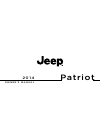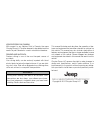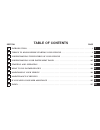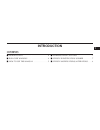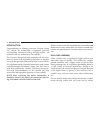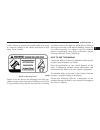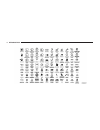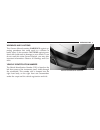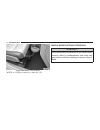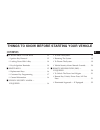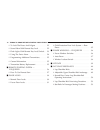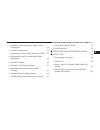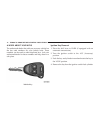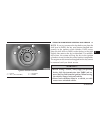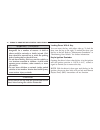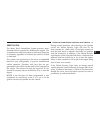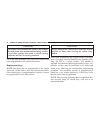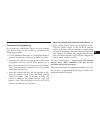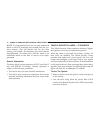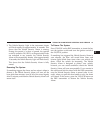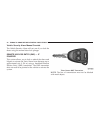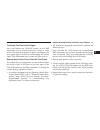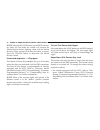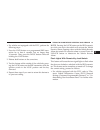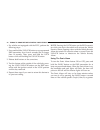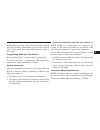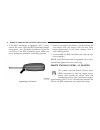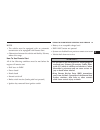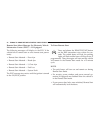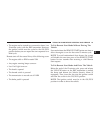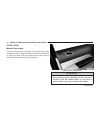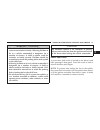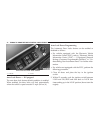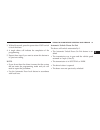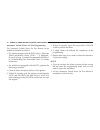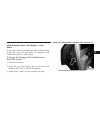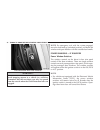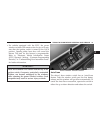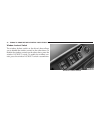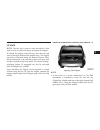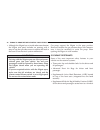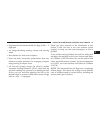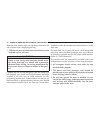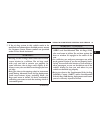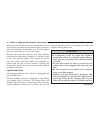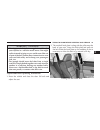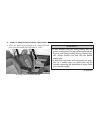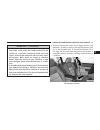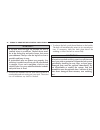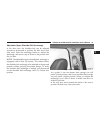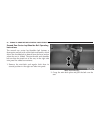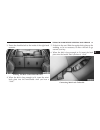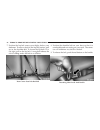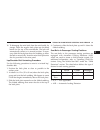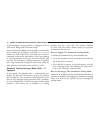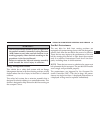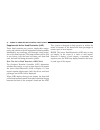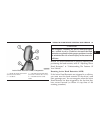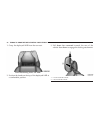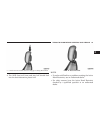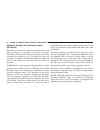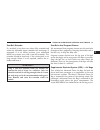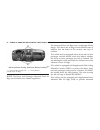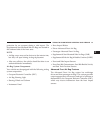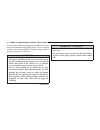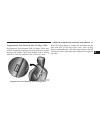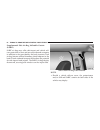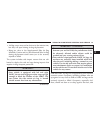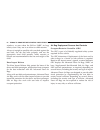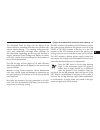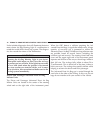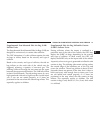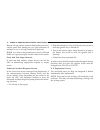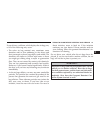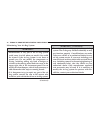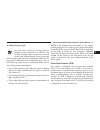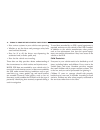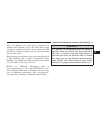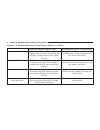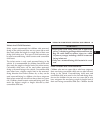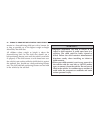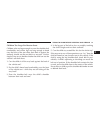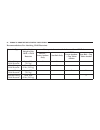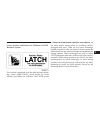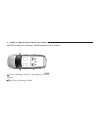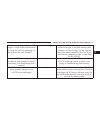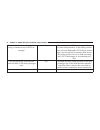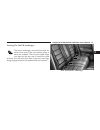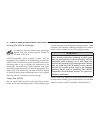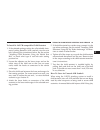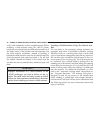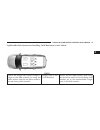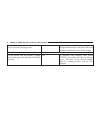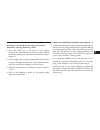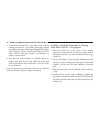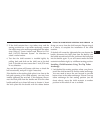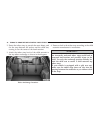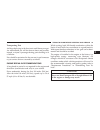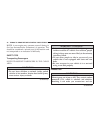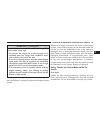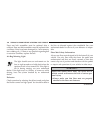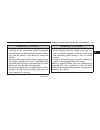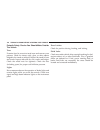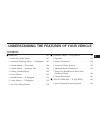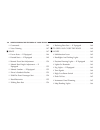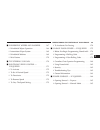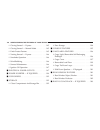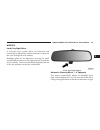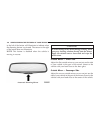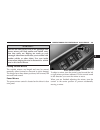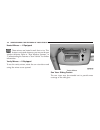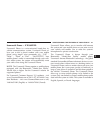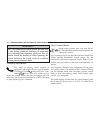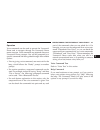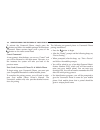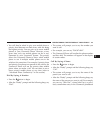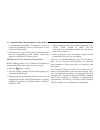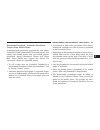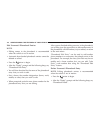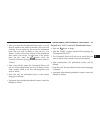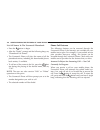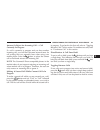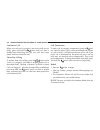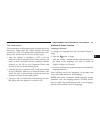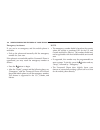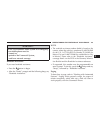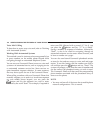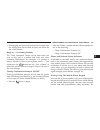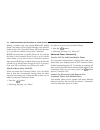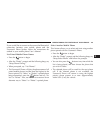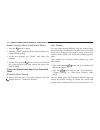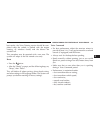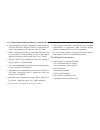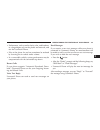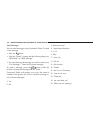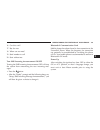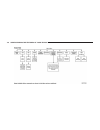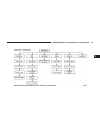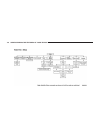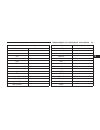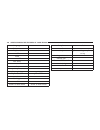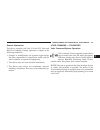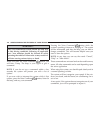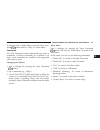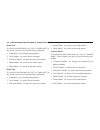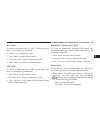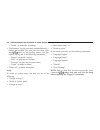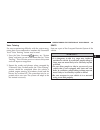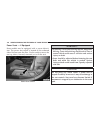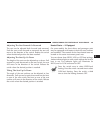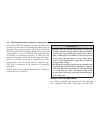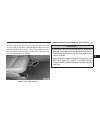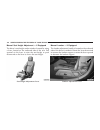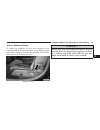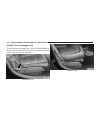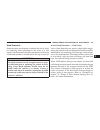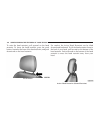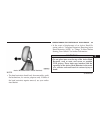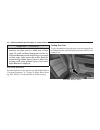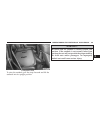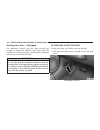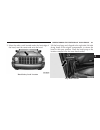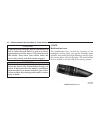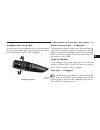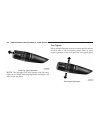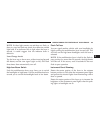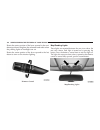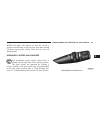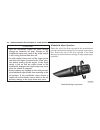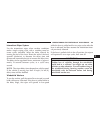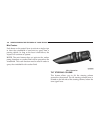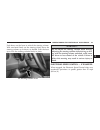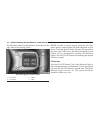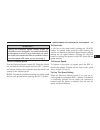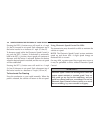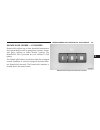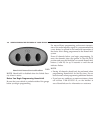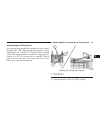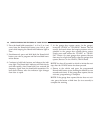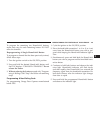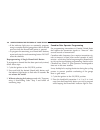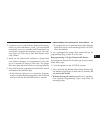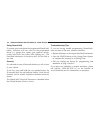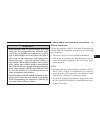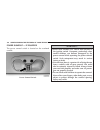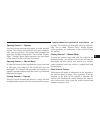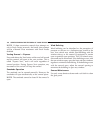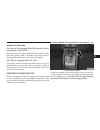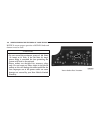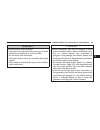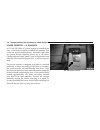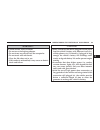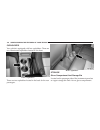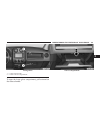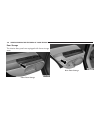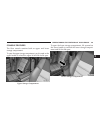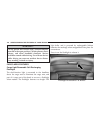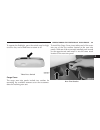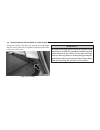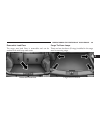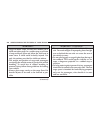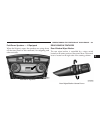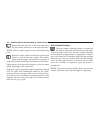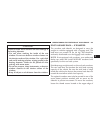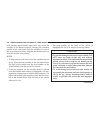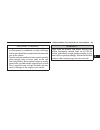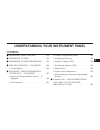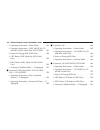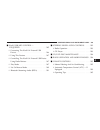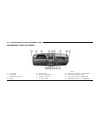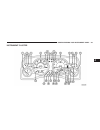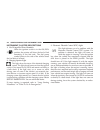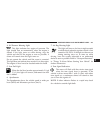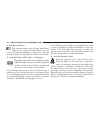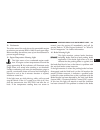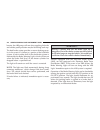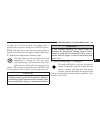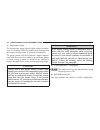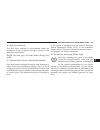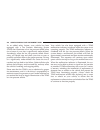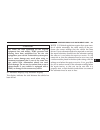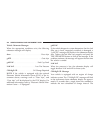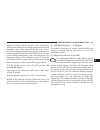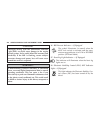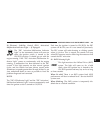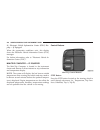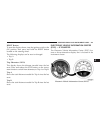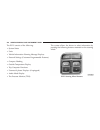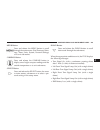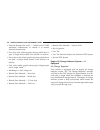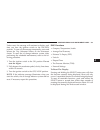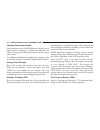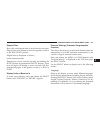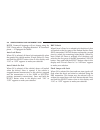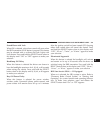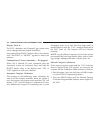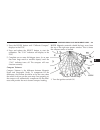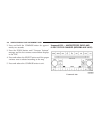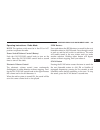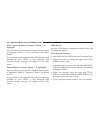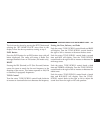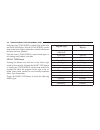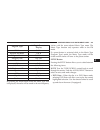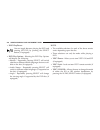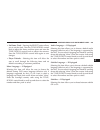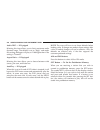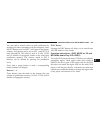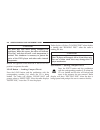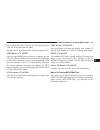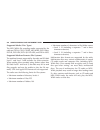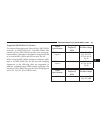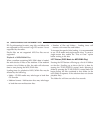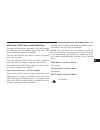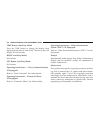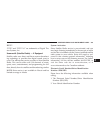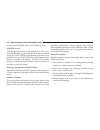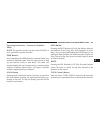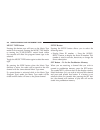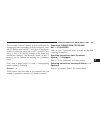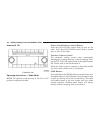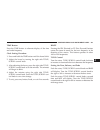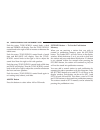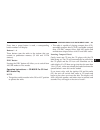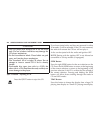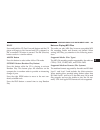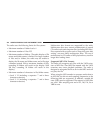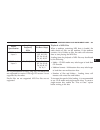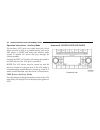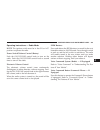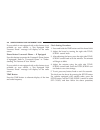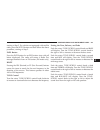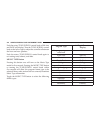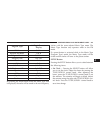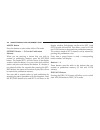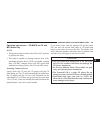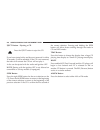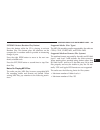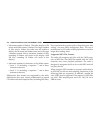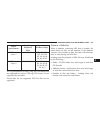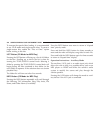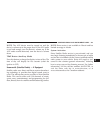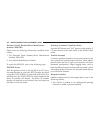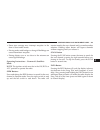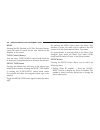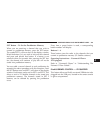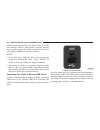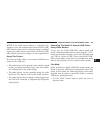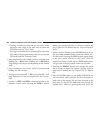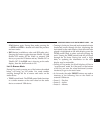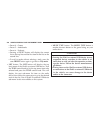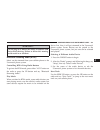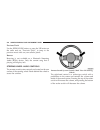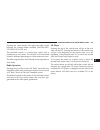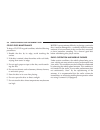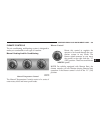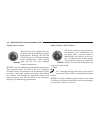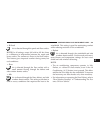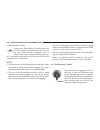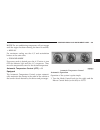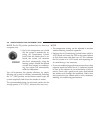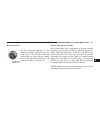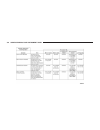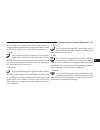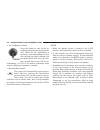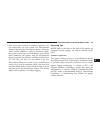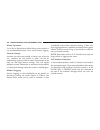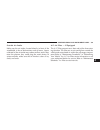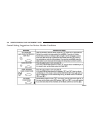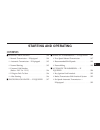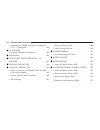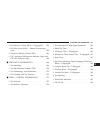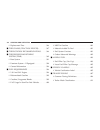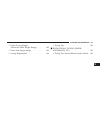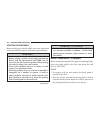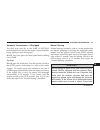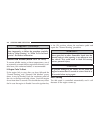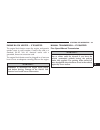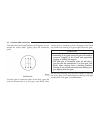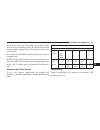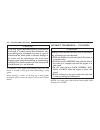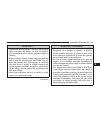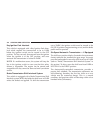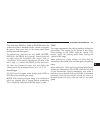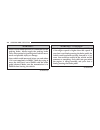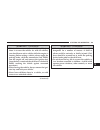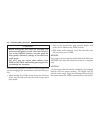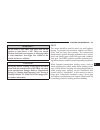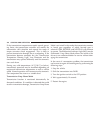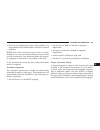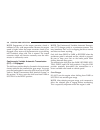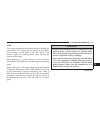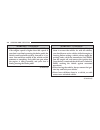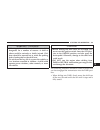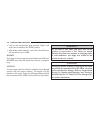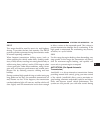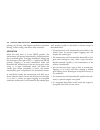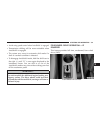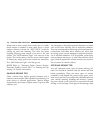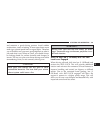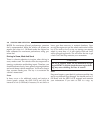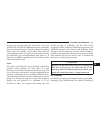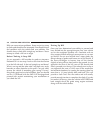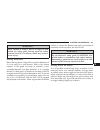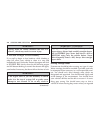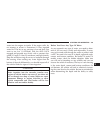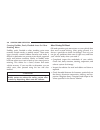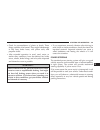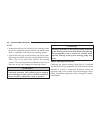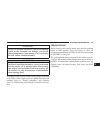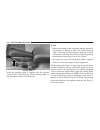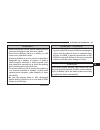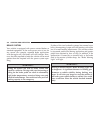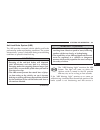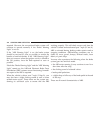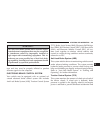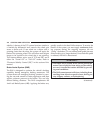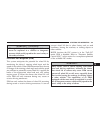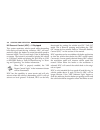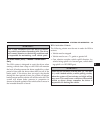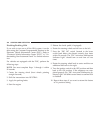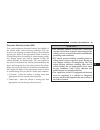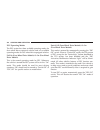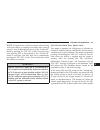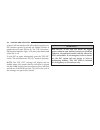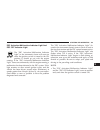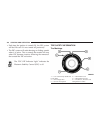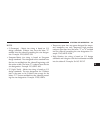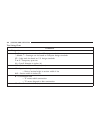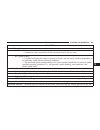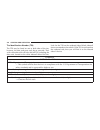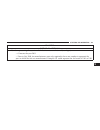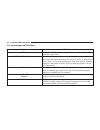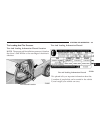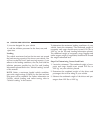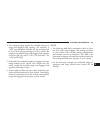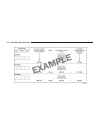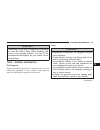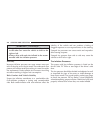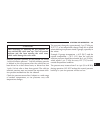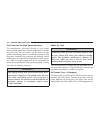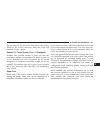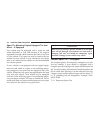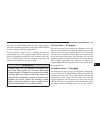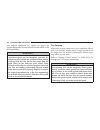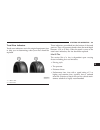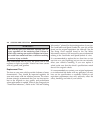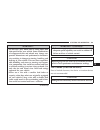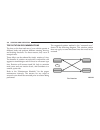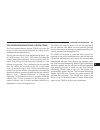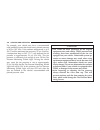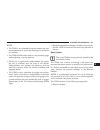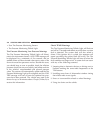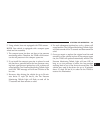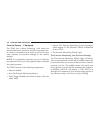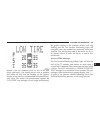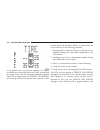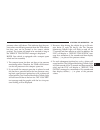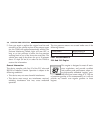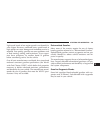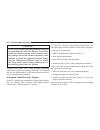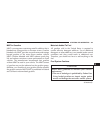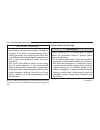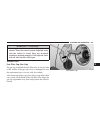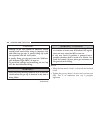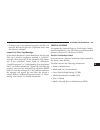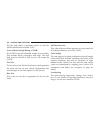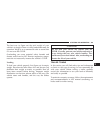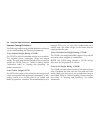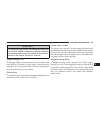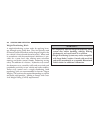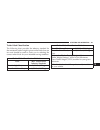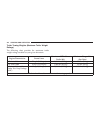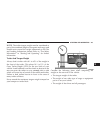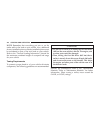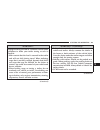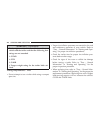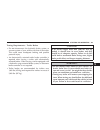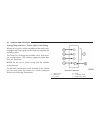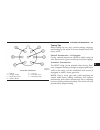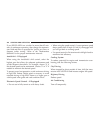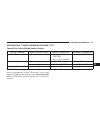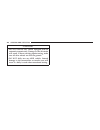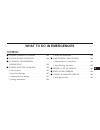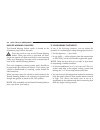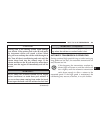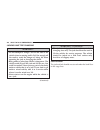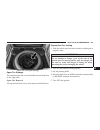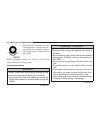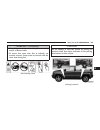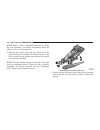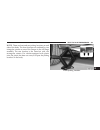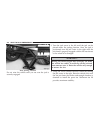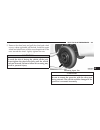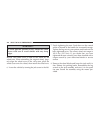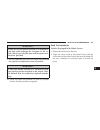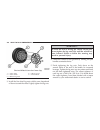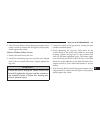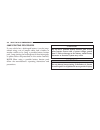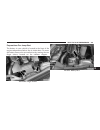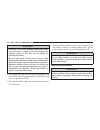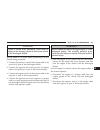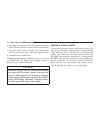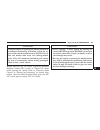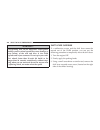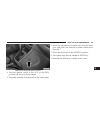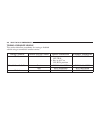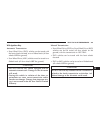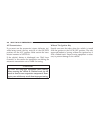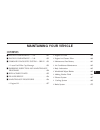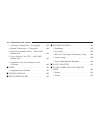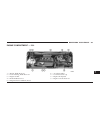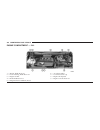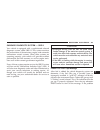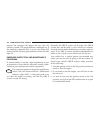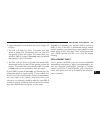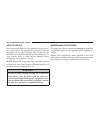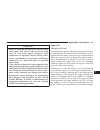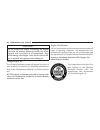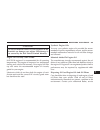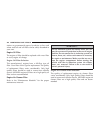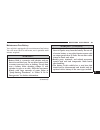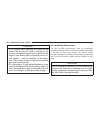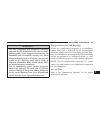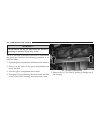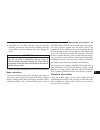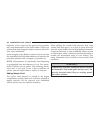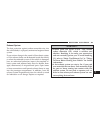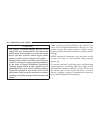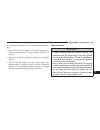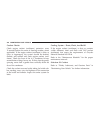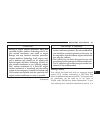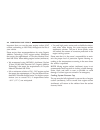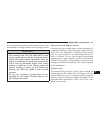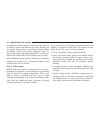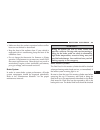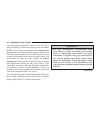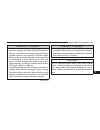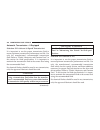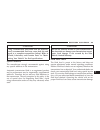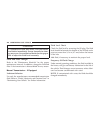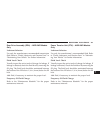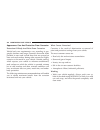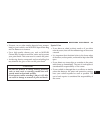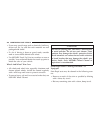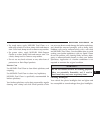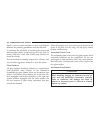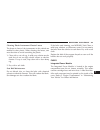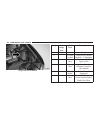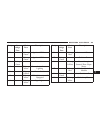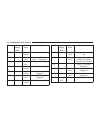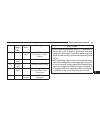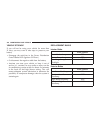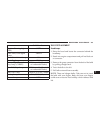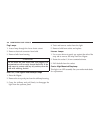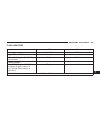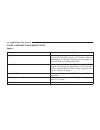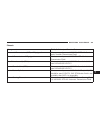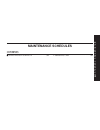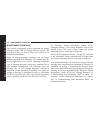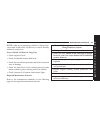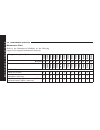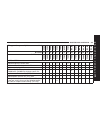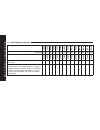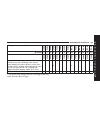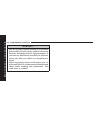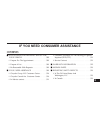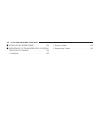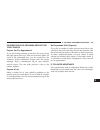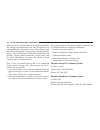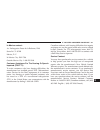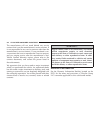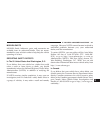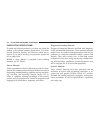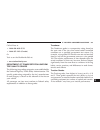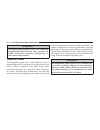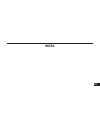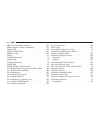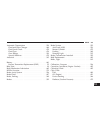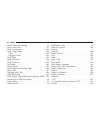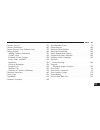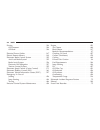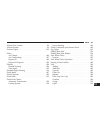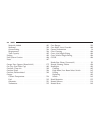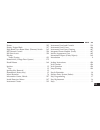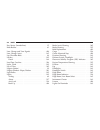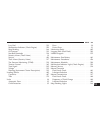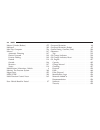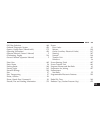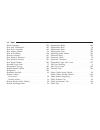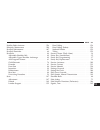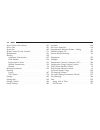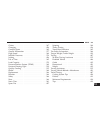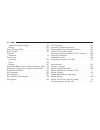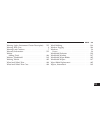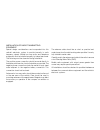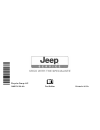- DL manuals
- Jeep
- Automobile
- 2014 Patriot
- Owner's Manual
Jeep 2014 Patriot Owner's Manual
Summary of 2014 Patriot
Page 1
Patriot o w n e r ’ s m a n u a l 2 0 1 4.
Page 2
Vehicles sold in canada with respect to any vehicles sold in canada, the name chrysler group llc shall be deemed to be deleted and the name chrysler canada inc. Used in substitution therefore. Driving and alcohol drunken driving is one of the most frequent causes of accidents. Your driving ability c...
Page 3: Table Of Contents
Table of contents section page 1 introduction . . . . . . . . . . . . . . . . . . . . . . . . . . . . . . . . . . . . . . . . . . . . . . . . . . . . . . . . . . . . . 3 2 things to know before starting your vehicle . . . . . . . . . . . . . . . . . . . . . . . . . . . . . 9 3 understanding the feat...
Page 5: Introduction
Introduction contents 䡵 introduction . . . . . . . . . . . . . . . . . . . . . . . .4 䡵 rollover warning . . . . . . . . . . . . . . . . . . .4 䡵 how to use this manual . . . . . . . . . . . . . .5 䡵 warnings and cautions . . . . . . . . . . . . . .7 䡵 vehicle identification number . . . . . . . .7 ...
Page 6
Introduction congratulations on selecting your new chrysler group llc vehicle. Be assured that it represents precision workmanship, distinctive styling, and high quality - all essentials that are traditional to our vehicles. This owner’s manual has been prepared with the assis- tance of service and ...
Page 7
Control. Failure to operate this vehicle safely may result in a collision, rollover of the vehicle, and severe or fatal injury. Drive carefully. Failure to use the driver and passenger seat belts pro- vided is a major cause of severe or fatal injury. In fact, the u.S. Government notes that the unive...
Page 8
6 introduction.
Page 9
Warnings and cautions this owners manual contains warnings against op- erating procedures that could result in a collision or bodily injury. It also contains cautions against proce- dures that could result in damage to your vehicle. If you do not read this entire owners manual, you may miss importan...
Page 10
Note: it is illegal to remove or alter the vin. Vehicle modifications/alterations warning! Any modifications or alterations to this vehicle could seriously affect its roadworthiness and safety and may lead to a collision resulting in serious injury or death. Right front body vin location 8 introduct...
Page 11: Contents
Things to know before starting your vehicle contents 䡵 a word about your keys . . . . . . . . . . . . . .12 ▫ ignition key removal . . . . . . . . . . . . . . . . . . .12 ▫ locking doors with a key. . . . . . . . . . . . . . . .14 ▫ key-in-ignition reminder. . . . . . . . . . . . . . . . .14 䡵 sentr...
Page 12
▫ to lock the doors and liftgate . . . . . . . . . . . .22 ▫ sound horn with remote key lock . . . . . . . . .22 ▫ flash lights with remote key lock/unlock . . .23 ▫ using the panic alarm . . . . . . . . . . . . . . . . . .24 ▫ programming additional transmitters. . . . . . . .25 ▫ general informati...
Page 13
▫ automatic locking retractor mode (alr) — if equipped . . . . . . . . . . . . . . . . . . . . . . . . . .54 ▫ seat belt pretensioners . . . . . . . . . . . . . . . . . .55 ▫ supplemental active head restraints (ahr) . . .56 ▫ enhanced seat belt use reminder system (beltalert®) . . . . . . . . . . ....
Page 14
A word about your keys the authorized dealer that sold you your new vehicle has the key code numbers for your vehicle locks. These numbers can be used to order duplicate keys. Ask your authorized dealer for these numbers and keep them in a safe place. Ignition key removal 1. Place the shift lever in...
Page 15
Note: if you try to remove the key before you place the shift lever in park, the key may become trapped tem- porarily in the ignition switch cylinder. If this occurs, place the shift lever in park, rotate the key to the right slightly, then remove the key as described. If a malfunc- tion occurs, the...
Page 16
Warning! (continued) • allowing children to be in a vehicle unattended is dangerous for a number of reasons. A child or others could be seriously or fatally injured. Chil- dren should be warned not to touch the parking brake, brake pedal or the shift lever. • do not leave the key fob in or near the ...
Page 17
Sentry key® the sentry key® immobilizer system prevents unau- thorized vehicle operation by disabling the engine. The system does not need to be armed or activated. Operation is automatic, regardless of whether the vehicle is locked or unlocked. The system uses ignition keys that have an embedded el...
Page 18
Caution! The sentry key® immobilizer system is not compat- ible with some after-market remote starting systems. Use of these systems may result in vehicle starting problems and loss of security protection. All of the keys provided with your new vehicle have been programmed to the vehicle electronics...
Page 19
Customer key programming if you have two valid sentry keys®, you can program new sentry keys® to the system by performing the following procedure: 1. Cut the additional sentry key® transponder blank(s) to match the ignition switch lock cylinder key code. 2. Insert the first valid key into the igniti...
Page 20
Note: if a programmed key is lost, see your authorized dealer to have all remaining keys erased from the sys- tem’s memory. This will prevent the lost key from starting your vehicle. The remaining keys must then be reprogrammed. All vehicle keys must be taken to an authorized dealer at the time of s...
Page 21
3. The vehicle security light in the instrument cluster will flash rapidly for approximately 16 seconds. This shows that the vehicle security alarm is arming. During this period, if a door is opened, the ignition switch is turned to on/run, or the power door locks are unlocked in any manner, the veh...
Page 22
Vehicle security alarm manual override the vehicle security alarm will not arm if you lock the doors using the manual door lock plunger. Remote keyless entry (rke) — if equipped this system allows you to lock or unlock the doors and liftgate or activate the panic alarm from distances up to approxima...
Page 23
To unlock the doors and liftgate press and release the unlock button on the rke transmitter once to unlock the driver’s door, or twice within five seconds to unlock all doors and liftgate. The turn signal lights will flash to acknowledge the unlock signal. The illuminated entry system will also turn...
Page 24
Note: pressing the lock button on the rke transmit- ter while you are inside the vehicle will activate the vehicle security alarm. Opening a door with the vehicle security alarm activated will cause the alarm to sound. Press the unlock button to deactivate the vehicle security alarm. Illuminated app...
Page 25
• for vehicles not equipped with the evic, perform the following steps: 1. Press the lock button on a programmed rke trans- mitter for at least 4 seconds, but no longer than 10 seconds. Then, press the panic button while still holding the lock button. 2. Release both buttons at the same time. 3. Tes...
Page 26
• for vehicles not equipped with the evic, perform the following steps: 1. Press and hold the unlock button on a programmed rke transmitter for at least 4 seconds, but no longer than 10 seconds. Then, press and hold the lock button while still holding the unlock button. 2. Release both buttons at th...
Page 27
Note: when you turn off the panic alarm by pressing the panic button a second time, you may have to move closer to the vehicle due to the radio frequency noises of the system. Programming additional transmitters refer to sentry key® “customer key programming.” if you do not have a programmed rke tra...
Page 28
1. If the rke transmitter is equipped with a screw, remove the screw. With the rke transmitter buttons facing down, use a flat blade screwdriver to pry the two halves of the rke transmitter apart. Make sure not to damage the elastomer seal during removal. 2. Remove and replace the battery. Avoid tou...
Page 29
Note: • the vehicle must be equipped with an automatic transmission to be equipped with remote start. • obstructions between the vehicle and the key fob may reduce this range. How to use remote start all of the following conditions must be met before the engine will remote start: • shift lever in pa...
Page 30
Remote start abort message on electronic vehicle information center (evic) — if equipped the following messages will display in the evic if the vehicle fails to remote start or exits remote start prema- turely: • remote start aborted — door ajar • remote start aborted — hood ajar • remote start abor...
Page 31
• the engine can be started two consecutive times (two 15-minute cycles) with the rke transmitter. However, the ignition switch must be cycled to the on/run position before you can repeat the start sequence for a third cycle. Remote start will also cancel if any of the following occur: • the engine ...
Page 32
Door locks manual door locks use the manual door lock knob to lock the doors from inside the vehicle. If the lock knob is down when the door is closed, the door will lock. Make sure the keys are not inside the vehicle before closing the door. Warning! • for personal security and safety in the event ...
Page 33
Warning! (continued) • never leave children alone in a vehicle, or with access to an unlocked vehicle. Allowing children to be in a vehicle unattended is dangerous for a number of reasons. A child or others could be seriously or fatally injured. Children should be warned not to touch the parking bra...
Page 34
Auto lock doors — if equipped the auto door lock feature default condition is enabled. When enabled, the door locks will lock automatically when the vehicle’s speed exceeds 15 mph (24 km/h). Auto lock doors programming the automatic door locks feature can be enabled or disabled as follows: • for veh...
Page 35
3. Within 30 seconds, press the power door lock switch to lock the doors. 4. A single chime will indicate the completion of the programming. 5. Repeat these steps if you want to return this feature to its previous setting. Note: • if you do not hear the chime it means that the system did not enter t...
Page 36
Automatic unlock doors on exit programming the automatic unlock doors on exit feature can be enabled or disabled as follows: • for vehicles equipped with the evic, refer to “electronic vehicle information center (evic) — if equipped/ personal settings (customer-programmable features)” in “understand...
Page 37
Child-protection door lock system — rear doors to provide a safer environment for small children riding in the rear seats, the rear doors are equipped with child-protection door lock system. To engage or disengage the child-protection door lock system 1. Open the rear door. 2. Insert the tip of the ...
Page 38
Warning! Avoid trapping anyone in a vehicle in a collision. Remember that the rear doors can only be opened from the outside when the child-protection locks are engaged. Note: for emergency exit with the system engaged, move the lock knob up (unlocked position), roll down the window and open the doo...
Page 39
• for vehicles equipped with the evic, the power window switches will remain active for up to 10 min- utes after the ignition switch is turned to the lock position. Opening either front door will cancel this feature. The time for this feature is programmable. Refer to “electronic vehicle information...
Page 40
Window lockout switch the window lockout switch on the driver’s door allows you to disable the window control on the other doors. To disable the window controls on the other doors, press the window lockout switch. To enable the window con- trols, press the window lockout switch a second time. Window...
Page 41
Liftgate note: the key that is used to start the vehicle is also used to lock or unlock the doors and open the liftgate. To unlock the liftgate, insert the key into the lock and turn to the right (manual lock models only). The liftgate can also be unlocked using the remote keyless entry (rke) transm...
Page 42
• although the liftgate has no inside release mechanism, the liftgate trim panel includes an opening with a snap-in cap that provides access to release the latch in the event of an electrical system malfunction. Warning! • driving with the liftgate open can allow poisonous exhaust gases into your ve...
Page 43
• supplemental seat-mounted side air bags (sab) — if equipped • an energy-absorbing steering column and steering wheel • knee bolsters for front seat occupants • front seat belts incorporate pretensioners that may enhance occupant protection by managing occupant energy during an impact event • all s...
Page 44
Here are some simple steps you can take to minimize the risk of harm from a deploying air bag: 1. Children 12 years old and under should always ride buckled up in a rear seat. Warning! Infants in rear facing child restraints should never ride in the front seat of a vehicle with a passenger advanced ...
Page 45
5. If the air bag system in this vehicle needs to be modified to accommodate a disabled person, contact the customer center. Phone numbers are provided under ⴖif you need assistanceⴖ. Warning! • relying on the air bags alone could lead to more severe injuries in a collision. The air bags work with y...
Page 46
Buckle up even though you are an excellent driver, even on short trips. Someone on the road may be a poor driver and cause a collision that includes you. This can happen far away from home or on your own street. Research has shown that seat belts save lives, and they can reduce the seriousness of in...
Page 47
Warning! (continued) • wearing your belt in the wrong place could make your injuries in a collision much worse. You might suffer internal injuries, or you could even slide out of part of the belt. Follow these instructions to wear your seat belt safely and to keep your passengers safe, too. • two pe...
Page 48
3. When the belt is long enough to fit, insert the latch plate into the buckle until you hear a “click.” warning! • a belt buckled into the wrong buckle will not protect you properly. The lap portion could ride too high on your body, possibly causing internal inju- ries. Always buckle your belt into...
Page 49
Warning! (continued) • a belt that is worn under your arm is dangerous. Your body could strike the inside surfaces of the vehicle in a collision, increasing head and neck injury. A belt worn under the arm can cause inter- nal injuries. Ribs aren’t as strong as shoulder bones. Wear the belt over your...
Page 50
Warning! • a lap belt worn too high can increase the risk of internal injury in a collision. The belt forces won’t be at the strong hip and pelvic bones, but across your abdomen. Always wear the lap belt as low as possible and keep it snug. • a twisted belt may not protect you properly. In a collisi...
Page 51
Adjustable upper shoulder belt anchorage in the front seat, the shoulder belt can be adjusted upward or downward to position the belt away from your neck. Push the anchorage button to release the anchorage, and move it up or down to the position that fits you best. Note: the adjustable upper shoulde...
Page 52
Second row center lap/shoulder belt operating instructions the second row center lap/shoulder belt features a three-point seat belt with a mini-latch and buckle, which allows the shoulder belt to detach from the lower anchor when the seat is folded. The mini-buckle and shoulder belt can then be stor...
Page 53
3. Route the shoulder belt to the inside of the right head restraint. 4. When the belt is long enough to fit, insert the mini- latch plate into the mini-buckle until you hear a “click.” 5. Sit back in the seat. Slide the regular latch plate up the webbing as far as necessary to allow the belt to go ...
Page 54
7. Position the lap belt across your thighs, below your abdomen. To remove slack in the lap belt portion, pull up on the shoulder belt. To loosen the lap belt if it is too tight, pull on the lap belt. A snug belt reduces the risk of sliding under the belt in a collision. 8. Position the shoulder bel...
Page 55
10. To disengage the mini-latch from the mini-buckle for storage, insert the regular latch plate into the black button on the top of the mini-buckle. The belt will automatically retract to its stowed position. If neces- sary, slide the latch plate down the webbing to allow the belt to retract fully....
Page 56
If the passenger seating position is equipped with an alr and is being used for normal usage: only pull the belt webbing out far enough to comfortably wrap around the occupant’s mid-section so as to not activate the alr. If the alr is activated, you will hear a ratcheting sound as the belt retracts....
Page 57
Warning! • the belt and retractor assembly must be replaced if the seat belt assembly automatic locking retractor (alr) feature or any other seat belt function is not working properly when checked according to the procedures in the service manual. • failure to replace the belt and retractor assembly...
Page 58
Supplemental active head restraints (ahr) these head restraints are passive, deployable compo- nents, and vehicles with this equipment cannot be readily identified by any markings, only through visual inspec- tion of the head restraint. The head restraint will be split in two halves, with the front ...
Page 59
Caution! All occupants, including the driver, should not oper- ate a vehicle or sit in a vehicle’s seat until the head restraints are placed in their proper positions in order to minimize the risk of neck injury in the event of a collision. Note: for more information on properly adjusting and positi...
Page 60
1. Grasp the deployed ahr from the rear seat. 2. Position the hands on the top of the deployed ahr at a comfortable position. 3. Pull down then rearward towards the rear of the vehicle then down to engage the locking mechanism. Hand positioning points on ahr 1 — downward movement 2 — rearward moveme...
Page 61
4. The ahr front soft foam and trim half should lock into the back decorative plastic half. Note: • if you have difficulties or problems resetting the active head restraints, see an authorized dealer. • for safety reasons, have the active head restraints checked by a qualified specialist at an autho...
Page 62
Enhanced seat belt use reminder system (beltalert®) beltalert® is a feature intended to remind the driver and front passenger (if equipped with front passenger beltalert®) to fasten their seat belts. The feature is active whenever the ignition is on. If the driver or front seat passenger is unbelted...
Page 63
Seat belt extender if a seat belt is too short even when fully extended and when the adjustable upper shoulder belt anchorage (if equipped) is in its lowest position, your authorized dealer can provide you with a seat belt extender. This extender should be used only if the existing belt is not long ...
Page 64
Note: the driver and passenger advanced front air bags are certified to new federal regulations. The advanced front air bags have a multistage inflator design. This allows the air bag to have different rates of inflation that are based on the severity and type of collision. This vehicle may be equip...
Page 65
Protection for an occupant during a side impact. The supplemental seat-mounted side air bags are located in the outboard side of the front seats. Note: • air bag covers may not be obvious in the interior trim, but they will open during air bag deployment. • after any collision, the vehicle should be...
Page 66
The first stage inflator is triggered immediately during an impact that requires air bag deployment. This low output is used in less severe collisions. A higher energy output is used for more severe collisions. Warning! • no objects should be placed over or near the air bag on the instrument panel, ...
Page 67
Supplemental seat-mounted side air bags (sab) supplemental seat-mounted side air bags (sab) may provide enhanced protection to help protect an occupant during a side impact. The sab is marked with an air bag label sewn into the outboard side of the front seats. When the air bag deploys, it opens the...
Page 68
Supplemental side air bag inflatable curtain (sabic) sabic air bags may offer side-impact and vehicle roll- over protection to front and rear seat outboard occupants in addition to that provided by the body structure. Each air bag features inflated chambers placed adjacent to the head of each outboa...
Page 69
• air bag covers may not be obvious in the interior trim, but they will open during air bag deployment. • being too close to the supplemental side air bag inflatable curtain and/or seat-mounted side air bag during deployment could cause you to be severely injured or killed. The system includes side ...
Page 70
Windows, or area where the sab or sabic air bags inflate, even if they are in an infant or child restraint. Always sit upright as possible with your back against the seat back, use the seat belts properly, and use the appropriate sized child restraint, infant restraint or booster seat recommended fo...
Page 71
The advanced front air bags will not deploy in all frontal collisions, including some that may produce sub- stantial vehicle damage — for example, some pole colli- sions, truck underrides, and angle offset collisions. On the other hand, depending on the type and location of impact, advanced front ai...
Page 72
It also includes diagnostics that will illuminate the instru- ment cluster air bag warning light if a malfunction is noted that could affect the air bag system. The diagnos- tics also record the nature of the malfunction. Warning! Ignoring the air bag warning light in your instru- ment panel could m...
Page 73
Supplemental seat-mounted side air bag (sab) inflator units the supplemental seat-mounted side air bags (sab) are designed to activate only in certain side collisions. The orc determines if a side collision requires the side air bags to inflate, based on the severity and type of collision. Based on ...
Page 74
Because air bag sensors estimate deceleration over time, vehicle speed and damage are not good indicators of whether or not an air bag should have deployed. Note: in a rollover the pretensioners and/or sab and sabic air bags may deploy on both sides of the vehicle. Front and side impact sensors in f...
Page 75
If you do have a collision, which deploys the air bags, any or all of the following may occur: • the nylon air bag material may sometimes cause abrasions and/or skin reddening to the driver and front passenger as the air bags deploy and unfold. The abrasions are similar to friction rope burns or tho...
Page 76
Maintaining your air bag system warning! • modifications to any part of the air bag system could cause it to fail when you need it. You could be injured if the air bag system is not there to protect you. Do not modify the components or wiring, including adding any kind of badges or stickers to the s...
Page 77
Air bag warning light you will want to have the air bags ready to inflate for your protection in a collision. The air bag warning light monitors the internal circuits and interconnecting wiring associated with air bag system electrical components. While the air bag system is designed to be maintenan...
Page 78
• how various systems in your vehicle were operating; • whether or not the driver and passenger safety belts were buckled/fastened; • how far (if at all) the driver was depressing the accelerator and/or brake pedal; and, • how fast the vehicle was traveling. These data can help provide a better unde...
Page 79
There are different sizes and types of restraints for children from newborn size to the child almost large enough for an adult safety belt. Always check the child seat owner’s manual to make sure you have the correct seat for your child. Before buying any restraint system, make sure that it has a la...
Page 80
Summary of recommendations for restraining children in vehicles child size, height, weight or age recommended type of child restraint infants and toddlers children who are two years old or younger and who have not reached the height or weight limits of their child restraint either an infant carrier ...
Page 81
Infants and child restraints safety experts recommend that children ride rearward- facing in the vehicle until they are two years old or until they reach either the height or weight limit of their rear facing child safety seat. Two types of child restraints can be used rearward-facing: infant carrie...
Page 82
Remain in a forward-facing child seat with a harness for as long as possible, up to the highest weight or height allowed by the child seat. All children whose weight or height is above the forward-facing limit for the child seat should use a belt-positioning booster seat until the vehicle’s seat bel...
Page 83
Children too large for booster seats children who are large enough to wear the shoulder belt comfortably, and whose legs are long enough to bend over the front of the seat when their back is against the seatback, should use the seat belt in a rear seat. Use this simple 5-step test to decide whether ...
Page 84
Recommendations for attaching child restraints restraint type combined weight of the child + child restraint use any attachment method shown with an “x” below latch – lower anchors only seat belt only latch – lower anchors + top tether anchor seat belt + top tether anchor rear-facing child restraint...
Page 85
Lower anchors and tethers for children (latch) restraint system your vehicle is equipped with the child restraint anchor- age system called latch, which stands for lower anchors and tethers for children. The latch system has three vehicle anchor points for installing latch- equipped child seats. The...
Page 86
Latch positions for installing child restraints in this vehicle lower anchorage symbol 2 anchorages per seating position top tether anchorage symbol 84 things to know before starting your vehicle.
Page 87
What is the weight limit (child’s weight + weight of the child restraint) for using the latch anchorage sys- tem to attach the child restraint? 65 lbs (29.5 kg) use the latch anchorage system until the combined weight of the child and the child restraint is 65 lbs (29.5 kg). Use the seat belt and te...
Page 88
Can two child restraints be attached using a common lower latch an- chorage? No never “share” a latch anchorage with two or more child restraints. If the center position does not have dedicated latch lower anchor- ages, use the seat belt to install a child seat in the center position next to a child...
Page 89
Locating the latch anchorages the lower anchorages are round bars that are found at the rear of the seat cushion where it meets the seatback. They are just visible when you lean into the rear seat to install the child restraint. You will easily feel them if you run your finger along the gap between ...
Page 90
Locating the latch anchorages in addition, there are tether strap anchorages behind each rear seating position located on the back of the seat. Latch-compatible child restraint systems will be equipped with a rigid bar or a flexible strap on each side. Each will have a hook or connector to attach to...
Page 91
To install a latch-compatible child restraint 1. If the selected seating position has a switchable auto- matic locking retractor (alr) seat belt, stow the seat belt, following the instructions below. See the section “installing child restraints using the vehicle seat belt” to check what type of seat...
Page 92
With it and accidentally lock the seatbelt retractor. Before installing a child restraint using the latch system, buckle the seat belt behind the child restraint and out of the child’s reach. If the buckled seat belt interferes with the child restraint installation, instead of buckling it behind the...
Page 93
Lap/shoulder belt systems for installing child restraints in this vehicle what is the weight limit (child’s weight + weight of the child restraint) for using the tether anchor with the seat belt to attach a forward facing child restraint? Weight limit of the child restraint always use the tether anc...
Page 94
Can the rear-facing child restraint touch the back of the front passenger seat? Yes contact between the front passenger seat and the child restraint is allowed, if the child restraint manufacturer also allows contact. Can the head restraints be removed? No can the buckle stalk be twisted to tighten ...
Page 95
Installing a child restraint with a switchable automatic locking retractor (alr) 1. Place the child seat in the center of the seating position. For some second row seats, you may need to recline the seat and/or raise the head restraint to get a better fit. 2. Pull enough of the seat belt webbing fro...
Page 96
8. If the child restraint has a top tether strap and the seating position has a top tether anchorage, connect the tether strap to the anchorage and tighten the tether strap. Refer to “lower anchors and tethers for chil- dren (latch) restraint system” for directions to attach a tether anchor. 9. Test...
Page 97
5. If the child restraint has a top tether strap and the seating position has a top tether anchorage, connect the tether strap to the anchorage and tighten the tether strap. Refer to “lower anchors and tethers for chil- dren (latch) restraint system” for directions to attach a tether anchor. 6. Test...
Page 98
2. Route the tether strap to provide the most direct path for the strap between the anchor and the child seat, routing it over the center of the head restraint. 3. Attach the tether strap hook of the child restraint to the top tether anchorage as shown in the diagram. 4. Remove slack in the tether s...
Page 99
Transporting pets air bags deploying in the front seat could harm your pet. An unrestrained pet will be thrown about and possibly injured, or injure a passenger during panic braking or in a collision. Pets should be restrained in the rear seat in pet harnesses or pet carriers that are secured by sea...
Page 100
Note: a new engine may consume some oil during its first few thousand miles (kilometers) of operation. This should be considered a normal part of the break-in and not interpreted as an indication of difficulty. Safety tips transporting passengers never transport passengers in the cargo area. Warning...
Page 101
Warning! (continued) eventually poison you. To avoid breathing (co), follow these safety tips: • do not run the engine in a closed garage or in confined areas any longer than needed to move your vehicle in or out of the area. • if you are required to drive with the trunk/liftgate open, make sure tha...
Page 102
Front seat belt assemblies must be replaced after a collision. Rear seat belt assemblies must be replaced after a collision if they have been damaged (i.E., bent retractor, torn webbing, etc.). If there is any question regarding belt or retractor condition, replace the belt. Air bag warning light th...
Page 103
Warning! (continued) • never place or install floor mats or other floor coverings in the vehicle that cannot be properly secured to prevent them from moving and interfer- ing with the pedals or the ability to control the vehicle. • never put floor mats or other floor coverings on top of already inst...
Page 104
Periodic safety checks you should make outside the vehicle tires examine tires for excessive tread wear and uneven wear patterns. Check for stones, nails, glass, or other objects lodged in the tread or sidewall. Inspect the tread for cuts and cracks. Inspect sidewalls for cuts, cracks and bulges. Ch...
Page 105: Contents
Understanding the features of your vehicle contents 䡵 mirrors . . . . . . . . . . . . . . . . . . . . . . . . . . . .107 ▫ inside day/night mirror . . . . . . . . . . . . . . . .107 ▫ automatic dimming mirror — if equipped . . .107 ▫ outside mirror — driver side . . . . . . . . . . . .108 ▫ outside ...
Page 106
▫ commands . . . . . . . . . . . . . . . . . . . . . . . . . .143 ▫ voice training . . . . . . . . . . . . . . . . . . . . . . . .147 䡵 seats . . . . . . . . . . . . . . . . . . . . . . . . . . . . . .147 ▫ power seats — if equipped . . . . . . . . . . . . . .148 ▫ heated seats — if equipped . . . ....
Page 107
䡵 windshield wipers and washers . . . . . .167 ▫ windshield wiper operation . . . . . . . . . . . . .168 ▫ intermittent wiper system . . . . . . . . . . . . . . .169 ▫ windshield washers . . . . . . . . . . . . . . . . . . .169 ▫ mist feature . . . . . . . . . . . . . . . . . . . . . . . . .170 䡵 ti...
Page 108
▫ closing sunroof — express. . . . . . . . . . . . . . .185 ▫ closing sunroof — manual mode . . . . . . . . . .185 ▫ pinch protect feature . . . . . . . . . . . . . . . . . . .185 ▫ venting sunroof — express . . . . . . . . . . . . . .186 ▫ sunshade operation. . . . . . . . . . . . . . . . . . . .18...
Page 109
Mirrors inside day/night mirror a two-point pivot system allows for horizontal and vertical mirror adjustment. Adjust the mirror to center on the view through the rear window. Headlight glare can be reduced by moving the small control under the mirror to the night position (toward the rear of vehicl...
Page 110
To the left of the button will illuminate to indicate when the dimming feature is activated. The sensor to the right of the button does not illuminate. Note: this feature is disabled when the vehicle is moving in reverse. Caution! To avoid damage to the mirror during cleaning, never spray any cleani...
Page 111
Warning! Vehicles and other objects seen in the passenger side convex mirror will look smaller and farther away than they really are. Relying too much on your passenger side mirror could cause you to collide with another vehicle or other object. Use your inside mirror when judging the size or distan...
Page 112
Heated mirrors — if equipped these mirrors are heated to melt frost or ice. This feature is activated whenever you turn on the rear window defroster. Refer to “rear window features” in “understanding the features of your vehicle” for further information. Vanity mirrors — if equipped to use the vanit...
Page 113
Uconnect® phone — if equipped uconnect® phone is a voice-activated, hands-free, in- vehicle communications system. Uconnect® phone al- lows you to dial a phone number with your mobile phone using simple voice commands (e.G., “call” ѧ “mike” ѧ “work” or “dial” ѧ “248-555-1212”). Your mobile phone’s a...
Page 114
Warning! Any voice commanded system should be used only in safe driving conditions following all applicable laws, including laws regarding phone use. Your at- tention should be focused on safely operating the vehicle. Failure to do so may result in a collision causing serious injury or death. Uconne...
Page 115
Operation voice commands can be used to operate the uconnect® phone and to navigate through the uconnect® phone menu structure. Voice commands are required after most uconnect® phone prompts. You will be prompted for a specific command and then guided through the available options. • prior to giving...
Page 116
To activate the uconnect® phone, simply press the button and follow the audible prompts for directions. Uconnect® phone sessions begin with a press of the button on the radio control head. Cancel command at any prompt, after the beep, you can say “cancel” and you will be returned to the main menu. H...
Page 117
• you will then be asked to give your mobile phone a priority level between one and seven, with one being the highest priority. You can pair up to seven mobile phones to your uconnect® phone. However, at any given time, only one mobile phone can be in use, connected to your uconnect® system. The pri...
Page 118
Or downloaded phonebook. To learn how to store a name in the phonebook, refer to “add names to your uconnect® phonebook”. • the uconnect® system will confirm the name and then dial the corresponding phone number, which may appear in the display of certain radios. Add names to your uconnect® phoneboo...
Page 119
Phonebook download – automatic phonebook transfer from mobile phone if equipped and specifically supported by your phone, uconnect® phone automatically downloads names (text names) and number entries from your mobile phone’s phonebook. Specific bluetooth® phones with phone book access profile may su...
Page 120
Edit uconnect® phonebook entries note: • editing names in the phonebook is recommended when the vehicle is not in motion. • automatic downloaded phonebook entries cannot be deleted or edited. • press the button to begin. • after the “ready” prompt and the following beep, say “phonebook edit entry”. ...
Page 121
• after you enter the phonebook delete menu, you will then be asked for the name of the entry that you wish to delete. You can either say the name of a phonebook entry that you wish to delete or you can say “list names” to hear a list of the entries in the phonebook from which you choose. To select ...
Page 122
List all names in the uconnect® phonebook • press the button to begin. • after the “ready” prompt and the following beep, say “phonebook list names”. • the uconnect® phone will play the names of all the phonebook entries, including the downloaded phone- book entries, if available. • to call one of t...
Page 123
Answer or reject an incoming call — call currently in progress if a call is currently in progress and you have another incoming call, you will hear the same network tones for call waiting that you normally hear when using your mobile phone. Press the button to place the current call on hold and answ...
Page 124
Conference call when two calls are in progress (one active and one on hold), press and hold the button until you hear a double beep indicating that the two calls have been joined into one conference call. Three-way calling to initiate three-way calling, press the button while a call is in progress, ...
Page 125
Call continuation call continuation is the progression of a phone call on the uconnect® phone after the vehicle ignition has been switched to off. Call continuation functionality avail- able on the vehicle can be any one of three types: • after the ignition is switched to off, a call can continue on...
Page 126
Emergency assistance if you are in an emergency and the mobile phone is reachable: • pick up the phone and manually dial the emergency number for your area. If the phone is not reachable and the uconnect® phone is operational, you may reach the emergency number as follows: • press the button to begi...
Page 127
Warning! To use you uconnect® phone system in an emergency, your mobile phone must be: • turned on, • paired to the uconnect® system, • and have network coverage. Roadside assistance if you need roadside assistance: • press the button to begin. • after the “ready” prompt and the following beep, say ...
Page 128
Voice mail calling to learn how to access your voice mail, refer to “working with automated systems”. Working with automated systems this method is used in instances where one generally has to press numbers on the mobile phone keypad while navigating through an automated telephone system. You can us...
Page 129
• some paging and voice mail systems have system time out settings that are too short and may not allow the use of this feature. Barge in — overriding prompts the “voice command” button can be used when you wish to skip part of a prompt and issue your voice command immediately. For example, if a pro...
Page 130
Dialing a number with your paired bluetooth® mobile phone, the audio will be played through your vehicle’s audio system. The uconnect® phone will work the same as if you dial the number using voice command. Note: certain brands of mobile phones do not send the dial ring to the uconnect® phone to pla...
Page 131
If you would like to connect or disconnect the bluetooth® connection between your mobile phone and the uconnect® phone system, follow the instructions de- scribed in your mobile phone user’s manual. List paired mobile phone names • press the button to begin. • after the “ready” prompt and the follow...
Page 132
Delete uconnect® phone paired mobile phones • press the button to begin. • after the “ready” prompt and the following beep, say “setup phone pairing”. • at the next prompt, say “delete” and follow the prompts. • you can also press the button at any time while the list is being played, and then choos...
Page 133
Best results, the voice training session should be com- pleted when the vehicle is parked with the engine running, all windows closed, and the blower fan switched off. This procedure may be repeated with a new user. The system will adapt to the last trained voice only. Reset • press the button. • af...
Page 134
• even though the system is designed for users speaking in north american english, french, and spanish ac- cents, the system may not always work for some. • when navigating through an automated system such as voice mail, or when sending a page, at the end of speaking the digit string, make sure to s...
Page 135
• performance, such as audio clarity, echo, and loudness to a large degree rely on the phone and network, and not the uconnect® phone. • echo at the phone far end can sometimes be reduced by lowering the in-vehicle audio volume. • in a convertible vehicle, system performance may be compromised with ...
Page 136
Send messages: you can send messages using uconnect® phone. To send a new message: • press the button. • after the “ready” prompt and the following beep, say “sms send” or “send message.” • you can either say the message you wish to send or say “list messages.” there are 20 preset messages. To send ...
Page 137
16. Can this wait? 17. Bye for now 18. When can we meet? 19. Send number to call 20. Start without me turn sms incoming announcement on/off turning the sms incoming announcement off will stop the system from announcing the new incoming mes- sages. • press the button. • after the “ready” prompt and t...
Page 138
136 understanding the features of your vehicle.
Page 139
3 understanding the features of your vehicle 137.
Page 140
138 understanding the features of your vehicle.
Page 141
Voice commands primary alternate (s) zero one two three four five six seven eight nine star (*) plus (+) pound (#) add location all call cancel confirmation prompts continue delete dial download edit emergency english erase all espanol francais help home 3 understanding the features of your vehicle ...
Page 142
Language list names list phones mobile mute mute off new entry no other pair a phone phone pairing pairing phonebook phone book previous record again redial return to main menu return or main menu select phone select send set up phone settings or phone set up towing assistance transfer call uconnect...
Page 143
General information this device complies with part 15 of the fcc rules and rss 210 of industry canada. Operation is subject to the following conditions: • changes or modifications not expressly approved by the party responsible for compliance could void the user’s authority to operate the equipment....
Page 144
Warning! Any voice commanded system should be used only in safe driving conditions following all applicable laws. Your attention should be focused on safely operating the vehicle. Failure to do so may result in a collision causing serious injury or death. When you press the voice command button, you...
Page 145
To hear the first available menu, press the voice com- mand button and say “help” or “main menu”. Commands the voice command system understands two types of commands. Universal commands are available at all times. Local commands are available if the supported radio mode is active. Changing the volum...
Page 146
Radio am to switch to the am band, say “am” or “radio am”. In this mode, you may say the following commands: • “frequency #” (to change the frequency) • “next station” (to select the next station) • “previous station” (to select the previous station) • “radio menu” (to switch to the radio menu) • “m...
Page 147
Disc mode to switch to the disc mode, say “disc”. In this mode, you may say the following commands: • “track” (#) (to change the track) • “next track” (to play the next track) • “previous track” (to play the previous track) • “main menu” (to switch to the main menu) usb mode to switch to usb mode, s...
Page 148
– “delete” (to delete the recording) • “play memos” (to play previously recorded memos) — during the playback you may press the voice com- mand button to stop playing memos. You pro- ceed by saying one of the following commands: – “repeat” (to repeat a memo) – “next” (to play the next memo) – “previ...
Page 149
Voice training for users experiencing difficulty with the system recog- nizing their voice commands or numbers the uconnect® voice “voice training” feature may be used. 1. Press the voice command button, say “system setup” and once you are in that menu then say “voice training.” this will train your...
Page 150
Power seats — if equipped some models may be equipped with a power driver’s seat. The power seat switch is located on the outboard side of the seat near the floor. Use the switch to move the seat up, down, forward, rearward, or to tilt the seat. Warning! • adjusting a seat while driving may be dange...
Page 151
Adjusting the seat forward or rearward the seat can be adjusted both forward and rearward. Push the seat switch forward or rearward, the seat will move in the direction of the switch. Release the switch when the desired position has been reached. Adjusting the seat up or down the height of the seats...
Page 152
When the high-level setting is selected, the heater will provide a boosted heat level during the initial stages of operation. Then, the heat output will drop to the normal hi-level. If the hi-level setting is selected, the system will automatically switch to low-level after approximately 30 minutes ...
Page 153
While sitting in the seat, lift up on the bar and move the seat forward or rearward. Release the bar once you have reached the desired position. Then, using body pressure, move forward and rearward on the seat to be sure that the seat adjusters have latched. Warning! • adjusting a seat while driving...
Page 154
Manual seat height adjustment — if equipped the driver’s seat height can be raised or lowered by using a lever, located on the outboard side of the seat. Pull upward on the lever to raise the seat height or push downward on the lever to lower the seat height. Manual lumbar — if equipped the lumbar a...
Page 155
Driver’s seatback recline to adjust the seatback, lift the lever located on the outboard side of the seat, lean back to the desired angle and release the lever. To return the seatback, lift the lever, lean forward and release the lever. Warning! Do not ride with the seatback reclined so that the sho...
Page 156
Fold-flat front passenger seat to fold the front passenger seat, lift the recliner handle to the full upward position and push the seatback forward until it rests on the seat cushion. Fold-flat lever fold-flat seat 154 understanding the features of your vehicle.
Page 157
Head restraints head restraints are designed to reduce the risk of injury by restricting head movement in the event of a rear impact. Head restraints should be adjusted so that the top of the head restraint is located above the top of your ear. Warning! The head restraints for all occupants must be ...
Page 158
To raise the head restraint, pull upward on the head restraint. To lower the head restraint, press the push button, located at the base of the head restraint, and push downward on the head restraint. For comfort the active head restraints can be tilted forward and backward. To tilt the head restrain...
Page 159
Note: • the head restraints should only be removed by quali- fied technicians, for service purposes only. If either of the head restraints require removal, see your autho- rized dealer. • in the event of deployment of an active head re- straint, refer to “occupant restraints/resetting active head re...
Page 160
Warning! (continued) • active head restraints may be deployed if they are struck by an object such as a hand, foot or loose cargo. To avoid accidental deployment of the ac- tive head restraint ensure that all cargo is secured, as loose cargo could contact the active head re- straint during sudden st...
Page 161
To raise the seatback, pull the strap forward and lift the seatback into its upright position. Warning! Be certain that the seatback is securely locked into position. If the seatback is not securely locked into position the seat will not provide the proper stability for child seats and/or passengers...
Page 162
Reclining rear seat — if equipped for additional comfort, pull the strap forward just enough to release the seatback latch. Then push the seatback to a reclined position, approximately 35 degrees maximum, and release the strap. Warning! Do not ride with the seatback reclined so that the shoulder bel...
Page 163
2. Move the safety catch located under the front edge of the hood, near the center and raise the hood. Lift the hood prop rod, clipped to the right side (left side facing hood) of the engine compartment, to secure the hood in the open position. Place the hood prop at the location stamped into the in...
Page 164
Caution! To prevent possible damage, do not slam the hood to close it. Lower the hood until it is open 8 in (20 cm) approximately and then drop it. This should secure both latches. Never drive your vehicle unless the hood is fully closed, with both latches engaged. Warning! Be sure the hood is fully...
Page 165
Headlights and parking lights turn the end of the multifunction lever to the first detent to turn on the parking lights. Turn the end of the lever to the second detent to turn on the headlights. Daytime running lights — if equipped the high beam lights will come on as daytime running lights (lower i...
Page 166
Note: the fog lights will only operate with the head- lights on low beam. Selecting high beam headlights will turn off the fog lights. Turn signals move the multifunction lever up or down and the arrows on each side of the instrument cluster flash to show proper operation of the front and rear turn ...
Page 167
Note: if either light remains on and does not flash, or there is a very fast flash rate, check for a defective outside light bulb. If an indicator fails to light when the lever is moved, it would suggest that the indicator bulb is defective. Lane change assist tap the lever up or down once, without ...
Page 168
Rotate the center portion of the lever upward to the next detent position to brighten the odometer and radio when the parking lights or headlights are on. Rotate the center portion of the lever upward to the last detent to turn on the interior lighting. Map/reading lights these lights are mounted be...
Page 169
Note: the lights will remain on until the switch is pressed a second time, so be sure they have been turned off before leaving the vehicle. They will not turn off automatically. Windshield wipers and washers the windshield wiper/washer control lever is located on the right side of the steering colum...
Page 170
Caution! • turn the windshield wipers off when driving through an automatic car wash. Damage to the windshield wipers may result if the wiper control is left in any position other than off. • in cold weather, always turn off the wiper switch and allow the wipers to return to the “park” posi- tion be...
Page 171
Intermittent wiper system use the intermittent wiper when weather conditions make a single wiping cycle, with a variable pause be- tween cycles, desirable. Select the delay interval by turning the end of the lever. Rotate the end of the lever upward (clockwise) to decrease the delay time and downwar...
Page 172
Mist feature push down on the control lever to activate a single wipe to clear the windshield of road mist or spray from a passing vehicle. As long as the lever is held down, the wipers will continue to operate. Note: the mist feature does not activate the washer pump; therefore, no washer fluid wil...
Page 173
Push down on the lever to unlock the steering column. With one hand firmly on the steering wheel, move the steering column up or down, as desired. Push the lever up to lock the steering column firmly in place. Warning! Do not adjust the steering column while driving. Adjusting the steering column wh...
Page 174
The electronic speed control buttons are located on the right side of the steering wheel. Note: in order to ensure proper operation, the elec- tronic speed control system has been designed to shut down if multiple speed control functions are operated at the same time. If this occurs, the electronic ...
Page 175
Warning! Leaving the electronic speed control system on when not in use is dangerous. You could accidentally set the system or cause it to go faster than you want. You could lose control and have an accident. Always leave the system off when you are not using it. To set a desired speed turn the elec...
Page 176
Pressing the res (+) button once will result in a 1 mph (1.6 km/h) increase in set speed. Each subsequent tap of the button results in an increase of 1 mph (1.6 km/h). To decrease speed while the electronic speed control is set, push the set (-) button. If the button is continually held in the set (...
Page 177
Garage door opener — if equipped homelink® replaces up to three hand-held transmitters that operate devices such as garage door openers, motor- ized gates, lighting or home security systems. The homelink® unit is powered by your vehicles 12 volt battery. The homelink® buttons, located on either the ...
Page 178
Homelink® buttons/sunvisor/headliner note: homelink® is disabled when the vehicle secu- rity alarm is active. Before you begin programming homelink® be sure that your vehicle is parked outside of the garage before you begin programming. For more efficient programming and accurate transmis- sion of t...
Page 179
Programming a rolling code for programming garage door openers that were manu- factured after 1995. These garage door openers can be identified by the “learn” or “train” button located where the hanging antenna is attached to the garage door opener. It is not the button that is normally used to open...
Page 180
2. Place the hand-held transmitter 1 to 3 in (3 to 8 cm) away from the homelink® button you wish to pro- gram while keeping the homelink® indicator light in view. 3. Simultaneously press and hold both the homelink® button you want to program and the hand-held trans- mitter button. 4. Continue to hol...
Page 181
To program the remaining two homelink® buttons, repeat each step for each remaining button. Do not erase the channels. Reprogramming a single homelink® button to reprogram a channel that has been previously trained, follow these steps: 1. Turn the ignition switch to the on/run position. 2. Press and...
Page 182
• if the indicator light stays on constantly, program- ming is complete and the garage door/device should activate when the homelink® button is pressed. • to program the remaining two homelink® buttons, repeat each step for each remaining button. Do not erase the channels. Reprogramming a single hom...
Page 183
3. Continue to press and hold the homelink® button, while you press and release (“cycle”), your hand-held transmitter every two seconds until homelink® has successfully accepted the frequency signal. The indi- cator light will flash slowly and then rapidly when fully trained. 4. Watch for the homeli...
Page 184
Using homelink® to operate, press and release the programmed homelink® button. Activation will now occur for the programmed device (i.E., garage door opener, gate operator, security system, entry door lock, home/office lighting, etc.,). The hand-held transmitter of the device may also be used at any...
Page 185
Warning! • your motorized door or gate will open and close while you are programming the universal trans- ceiver. Do not program the transceiver if people, pets or other objects are in the path of the door or gate. Only use this transceiver with a garage door opener that has a “stop and reverse” fea...
Page 186
Power sunroof — if equipped the power sunroof switch is located on the overhead console. Warning! • never leave children in a vehicle with the key in the ignition switch. Occupants, particularly unat- tended children, can become entrapped by the power sunroof while operating the power sunroof switch...
Page 187
Opening sunroof — express press the switch rearward and release it within one-half second. The sunroof and sunshade will open automati- cally from any position. The sunroof and sunshade will open fully and stop automatically. This is called “express open”. During express open operation, any movement...
Page 188
Note: if three consecutive sunroof close attempts re- sult in pinch protect reversals, the fourth close attempt will be a manual close movement with pinch protect disabled. Venting sunroof — express press and release the vent button within one half second and the sunroof will open to the vent positi...
Page 189
Ignition off operation for vehicles not equipped with the electronic vehicle information center (evic) the power sunroof switch will remain active for 45 seconds after the ignition switch is turned to the lock position. Opening either front door will cancel this feature. For vehicles equipped with t...
Page 190
Note: to ensure proper operation a mopar® knob and element must be used. Caution! • do not exceed the maximum power of 160 watts (13 amps) at 12 volts. If the 160 watt (13 amp) power rating is exceeded the fuse protecting the system will need to be replaced. • power outlets are designed for accessor...
Page 191
Warning! To avoid serious injury or death: • only devices designed for use in this type of outlet should be inserted into any 12 volt outlet. • do not touch with wet hands. • close the lid when not in use and while driving the vehicle. • if this outlet is mishandled, it may cause an electric shock a...
Page 192
Power inverter — if equipped a 115 volt (150 watt) ac power inverter is located on the front of the center console for added convenience. This outlet can power mobile phones, electronics and other low power devices requiring power up to 150 watts. Certain high-end video games, such as playstation3 a...
Page 193
Warning! To avoid serious injury or death: • do not use a three-prong adaptor. • do not insert any objects into the receptacles. • do not touch with wet hands. • close the lid when not in use. • if this outlet is mishandled, it may cause an electric shock and failure. Caution! • many accessories tha...
Page 194
Cupholders your vehicle is equipped with four cupholders. There are two illuminated cupholders located in the front. There are two cupholders located in the back for the rear passengers. Storage glove compartment and storage bin located on the passenger side of the instrument panel are an upper stor...
Page 195
To open the lower glove compartment, pull outward on the release handle. Storage bins 1 — upper storage bin 2 — lower glove compartment glove compartment 3 understanding the features of your vehicle 193.
Page 196
Door storage the interior door panels are equipped with lower storage areas. Front door storage rear door storage 194 understanding the features of your vehicle.
Page 197
Console features the floor console contains both an upper and lower storage compartment. To open the upper storage compartment, push inward on the upper handle to unlatch the upper lid and lift the lid open. To open the lower storage compartment, lift upward on the lower handle to unlatch the lower ...
Page 198
Warning! Do not operate this vehicle with a console compart- ment lid in the open position. Cellular phones, music players, and other handheld electronic devices should be stowed while driving. Use of these devices while driving can cause an accident due to distrac- tion, resulting in death or injur...
Page 199
To operate the flashlight, press the switch once for high, twice for low, and a third time to return to off. Cargo cover the cargo area trim panels include two notches for mounting the available tonneau cover that accommo- dates the reclining rear seat. To install the cargo cover, insert either end ...
Page 200
Using the handle, pull the cover toward you and guide the rear cover posts into the guides located on both sides of the rear trim panel. Warning! In a collision a cargo cover loose in the vehicle could cause injury. It could fly around in a sudden stop and strike someone in the vehicle. Do not store...
Page 201
Removable load floor the cargo area load floor is removable and can be washed with mild soap and water. Cargo tie-down loops there are four tie-downs (d-rings) installed in the cargo area for securing cargo. Removable load floor cargo area tie-downs 3 understanding the features of your vehicle 199.
Page 202
Warning! • cargo tie-down loops are not safe anchors for a child seat tether strap. In a sudden stop or collision a loop could pull loose and allow the child seat to come loose. A child could be badly injured. Use only the anchors provided for child seat tethers. • the weight and position of cargo a...
Page 203
Fold down speakers — if equipped when the liftgate is open, the speakers can swing down off the trim panel to face rearward, for tailgating and other activities. Rear window features rear window wiper/washer the rear wiper/washer is controlled by a rotary switch located on the center portion of the ...
Page 204
Rotate the center portion of the lever upward to the first detent position for rear wiper operation. Note: the rear wiper operates in an intermittent mode only. Rotate the center portion of the lever past the first detent to activate the rear washer. The washer pump and the wiper will continue to op...
Page 205
Caution! Failure to follow these cautions can cause damage to the heating elements: • use care when washing the inside of the rear window. Do not use abrasive window cleaners on the interior surface of the window. Use a soft cloth and a mild washing solution, wiping parallel to the heating elements....
Page 206
Each crossbar approximately eight turns, then move the crossbar to the desired position, keeping the crossbars parallel to the rack frame. Once the crossbar is in one of the seven detent positions, retighten the thumb screws to lock the crossbar into position. Note: • to help control wind noise when...
Page 207
Caution! (continued) • long loads which extend over the windshield, such as wood panels or surfboards, or loads with large frontal area should be secured to both the front and rear of the vehicle. • travel at reduced speeds and turn corners carefully when carrying large or heavy loads on the roof ra...
Page 209: Contents
Understanding your instrument panel contents 䡵 instrument panel features. . . . . . . . . . .210 䡵 instrument cluster . . . . . . . . . . . . . . . . .211 䡵 instrument cluster descriptions . . . . .212 䡵 mini-trip computer — if equipped . . . . .226 ▫ control buttons . . . . . . . . . . . . . . . . ...
Page 210
▫ operating instructions - radio mode. . . . . . . .239 ▫ operation instructions - (disc mode for cd and mp3/wma audio play, dvd-video) . . .247 ▫ notes on playing mp3/wma files. . . . . . . . .249 ▫ list button (disc mode for mp3/wma play) . . . . . . . . . . . . . . . . . . . . . . . . . . . . . ....
Page 211
䡵 ipod®/usb/mp3 control — if equipped . . . . . . . . . . . . . . . . . . . . . . . . .285 ▫ connecting the ipod® or external usb device . . . . . . . . . . . . . . . . . . . . . . . . . . . . .286 ▫ using this feature. . . . . . . . . . . . . . . . . . . . .287 ▫ controlling the ipod® or external u...
Page 212
Instrument panel features 1 — air outlet 5 — storage bin 9 — heated seat switch – if equipped 2 — demisters 6 — glove compartment 10 — hazard warning flasher 3 — instrument cluster 7 — climate controls 11 — esc off switch – if equipped 4 — radio 8 — power outlet 12 — heated seat switch – if equipped...
Page 213
Instrument cluster 4 understanding your instrument panel 211.
Page 214
Instrument cluster descriptions 1. Fuel gauge/fuel door reminder when the ignition switch is in the on/run position, the pointer will show the level of fuel remaining in the fuel tank. The fuel pump symbol points to the side of the vehicle where the fuel door is located. 2. Charging system light thi...
Page 215
4. Oil pressure warning light this light indicates low engine oil pressure. The light should turn on momentarily when the engine is started. If the light turns on while driving, stop the vehicle and shut off the engine as soon as possible. A chime will sound when this light turns on. Do not operate ...
Page 216
9. High beam indicator this indicator shows that the high beam head- lights are on. Push the multifunction lever for- ward to switch the headlights to high beam, and pull toward yourself (normal position) to return to low beam. 10. Anti-lock brake (abs) light — if equipped this light monitors the an...
Page 217
12. Tachometer the white area of the scale shows the permissible engine revolutions-per-minute (rpm x 1000) for each gear range. Before reaching the red area, ease up on the accelerator to prevent engine damage. 13. Engine temperature warning light this light warns of an overheated engine condi- tio...
Page 218
Booster, the abs pump will run when applying the brake and a brake pedal pulsation may be felt during each stop. The dual brake system provides a reserve braking capac- ity in the event of a failure to a portion of the hydraulic system. A leak in either half of the dual brake system is indicated by ...
Page 219
The light also will turn on when the parking brake is applied with the ignition switch in the on/run position. Note: this light shows only that the parking brake is applied. It does not show the degree of brake application. 15. Transmission temperature warning light this light indicates that the tra...
Page 220
17. Temperature gauge the temperature gauge shows engine coolant tempera- ture. Any reading within the normal range indicates that the engine cooling system is operating satisfactorily. The gauge pointer will likely indicate a higher tempera- ture when driving in hot weather, up mountain grades, or ...
Page 221
20. Shift lever indicator the shift lever indicator is self-contained within the instrument cluster. It displays the gear position of the automatic transmission. Note: you must apply the brakes before shifting from park. 21. Odometer/trip odometer display reset button press this button to change the...
Page 222
As an added safety feature, your vehicle has been equipped with a tire pressure monitoring system (tpms) that illuminates a low tire pressure telltale when one or more of your tires is significantly under-inflated. Accordingly, when the low tire pressure telltale illumi- nates, you should stop and c...
Page 223
Caution! The tpms has been optimized for the original equipment tires and wheels. Tpms pressures and warning have been established for the tire size equipped on your vehicle. Undesirable system opera- tion or sensor damage may result when using re- placement equipment that is not of the same size, t...
Page 224
Vehicle odometer messages when the appropriate conditions exist, the following odometer messages will display: door . . . . . . . . . . . . . . . . . . . . . . . . . . . . . Door ajar gate . . . . . . . . . . . . . . . . . . . . . . . . . . . . . Gate ajar gascap . . . . . . . . . . . . . . . . . . ...
Page 225
Engine oil change indicator system is duty cycle based, which means the engine oil change interval may fluctuate dependent upon your personal driving style. Unless reset, this message will continue to display each time you turn the ignition switch to the on/run position. To turn off the message temp...
Page 226
Caution! Prolonged driving with the malfunction indicator light (mil) on could cause damage to the engine control system. It also could affect fuel economy and drivability. If the mil is flashing, severe catalytic converter damage and power loss will soon occur. Immediate service is required. Warnin...
Page 227
29. Electronic stability control (esc) activation/ malfunction indicator light — if equipped the “esc activation/malfunction indicator light” in the instrument cluster will come on when the ignition switch is turned to the on/run position. It should go out with the engine running. If the “esc activa...
Page 228
31. Electronic vehicle information center (evic) dis- play — if equipped when the appropriate conditions exist, this display shows the electronic vehicle information center (evic) messages. For further information, refer to “electronic vehicle in- formation center (evic)”. Mini-trip computer — if eq...
Page 229
Reset button to reset the display shown, turn the ignition switch to the on position, then press and hold the reset button located on the steering wheel. The following displays can be reset or changed: • trip a • trip b trip odometer (odo) this display shows the distance traveled since the last rese...
Page 230
The evic consists of the following: • system status • units • vehicle information warning message displays • personal settings (customer-programmable features) • compass heading • outside temperature display • trip computer functions • uconnect® phone displays (if equipped) • audio mode display • ti...
Page 231
Menu button press and release the menu button to scroll through the main menus (fuel economy, warn- ings, timer, units, system, personal settings) or to exit sub-menus. Compass button press and release the compass button to display one of eight compass readings and the outside temperature or to exit...
Page 232
• personal settings not avail. — vehicle not in park (automatic transmission) or vehicle is in motion (manual transmission). • door ajar (with vehicle graphic showing which door is open. A single chime sounds if the vehicle is in motion). • doors ajar (with vehicle graphic showing which doors are op...
Page 233
Unless reset, this message will continue to display each time you turn the ignition switch to the on/run position. To turn off the message temporarily, press and release the trip odometer button on the instrument cluster. To reset the oil change indicator system (after performing the scheduled maint...
Page 234
Compass/temperature/audio press and release the compass button to display one of eight compass headings to indicate the direction the vehicle is facing, the outside temperature, and the current radio station. For additional information regarding the compass, refer to personal settings (customer-prog...
Page 235
Elapsed time shows the total elapsed time of travel since the last reset. Elapsed time will increment when the ignition switch is in the run/start position. Elapsed time is displayed as follows: hours:minutes:seconds elapsed time can be reset by pressing and holding the select button (as prompted in...
Page 236
Note: uconnect® language will not change using the evic. Please refer to “language selection” in uconnect® phone — if equipped for details. Auto lock doors when on is selected, all doors lock automatically when the speed of the vehicle reaches 15 mph (24 km/h). Press and hold the select button when ...
Page 237
Sound horn with lock when on is selected, a short horn sound will occur when the rke transmitter lock button is pressed. This feature may be selected with or without the flash lights with lock feature. Press and hold the select button when in this display until “on” or “off” appears to make your sel...
Page 238
Display units in the evic, odometer, and uconnect® gps system units can be changed between english and metric. Press and hold the select button when in this display until “english” or “metric” appears to make your selection. Confirmation of voice commands — if equipped when on is selected, all voice...
Page 239
3. Press the down button until “calibrate compass” displays in the evic. 4. Press and release the select button to start the calibration. The “cal” indicator will display in the evic. 5. Complete one or more 360–degree turns (in an area free from large metal or metallic objects) until the “cal” indi...
Page 240
2. Press and hold the compass button for approxi- mately two seconds. 3. Press the down button until “compass variance” message and the last variance zone number displays in the evic. 4. Press and release the select button until the proper variance zone is selected according to the map. 5. Press and...
Page 241
Operating instructions - radio mode note: the ignition switch must be in the on or acc position to operate the radio. Power switch/volume control (rotary) push the on/volume control knob to turn on the radio. Press the on/volume control knob a second time to turn off the radio. Electronic volume con...
Page 242
Voice command button uconnect® phone — if equipped press this button to operate the uconnect® phone feature (if equipped). Refer to “voice command” for further details. If your vehicle is not equipped with or this feature is not available on your vehicle, a “not equipped with uconnect phone” message...
Page 243
The clock can also be set by pressing the setup button and selecting the “set home clock” entry. Once in this display follow the above procedure, starting at step 2. Info button press the info button for an rds station (one with call letters displayed). The radio will return a radio text message bro...
Page 244
Push the rotary tune/scroll control knob a fifth time and fade will display. Turn the tune/scroll control knob to the left or right to adjust the sound level between the front and rear speakers. Push the rotary tune/scroll control knob again to exit setting tone, balance, and fade. Music type button...
Page 245
Program type 16-digit character display public public rhythm and blues r & b religious music rel musc religious talk rel talk rock rock soft soft soft rock soft rck soft rhythm and blues soft r & b sports sports talk talk top 40 top 40 weather weather by pressing the seek button when the music type ...
Page 246
• disc play/pause - you can toggle between playing the dvd and pausing the dvd by pushing the select button (if equipped). • dvd play options - selecting the dvd play options will display the following: • subtitle – repeatedly pressing select will switch subtitles to different subtitle languages tha...
Page 247
• set home clock - pressing the select button allows you to set the clock. Turn the tune/scroll control knob to adjust the hours and then press and turn the tune/scroll control knob to adjust the minutes. Press the tune/scroll control knob again to save changes. • player defaults - selecting this it...
Page 248
Audio drc — if equipped selecting this item allows you to limit maximum audio dynamic range. The default is set to ⬙high,⬙ and under this setting, dialogues will play at 11 db higher than if the setting is ⬙normal.⬙ aspect ratio — if equipped selecting this item allows you to choose between wide scr...
Page 249
You may add a second station to each pushbutton by repeating the above procedure with this exception: press the set button twice and set 2 will show in the display window. Each button can be set for set 1 and set 2 in both am and fm. This allows a total of 12 am, 12 fm, and 12 satellite (if equipped...
Page 250
Caution! The radio may shut down during extremely hot conditions. When this occurs, the radio will indicate “disc hot” and shut off until a safe temperature is reached. This shutdown is necessary to protect the optics of the dvd player and other radio internal components. Note: the ignition switch m...
Page 251
Press and hold the eject button for five seconds and all cds will be ejected from the radio. The disc can be ejected with the radio and ignition off. Seek button (cd mode) press the right seek button for the next selection on the cd. Press the left seek button to return to the beginning of the curre...
Page 252
Supported media (disc types) the mp3/wma file recording media supported by the radio are cdda, cd-r, cd-rw, mp3,wma, dvd video, dvd-r, dvd-rw, dvd+r, dvd+rw, and cdda+mp3. Supported medium formats (file systems) the medium formats supported by the radio are iso 9660 level 1 and level 2 and includes ...
Page 253
Supported mp3/wma file formats the radio will recognize only files with the *.Mp3/wma extension as mp3/wma files. Non-mp3/wma files named with the *.Mp3/wma extension may cause play- back problems. The radio is designed to recognize the file as an invalid mp3/wma and will not play the file. When usi...
Page 254
Id3 tag information for artist, song title, and album title are supported for id3 version 1 tags. Id3 version 2 is not supported by the radios. Playlist files are not supported. Mp3 pro files are not supported. Playback of mp3/wma files when a medium containing mp3/wma data is loaded, the radio chec...
Page 255
Info button (disc mode for mp3/wma play) pressing the info button repeatedly will scroll through the following tag information: song title, artist, file name, and folder name (if available). Press the info button once more to return to ⬙elapsed time ⬙ priority mode. Press and hold the info button fo...
Page 256
Time button (auxiliary mode) press the time button to change the display from elapsed playing time to time of day. The time of day will display for five seconds. Rw/ff (auxiliary mode) no function. Set button (auxiliary mode) no function. Operating instructions — voice command system (if equipped) r...
Page 257
Dts™ “dts™ and “dts™ 2.0” are trademarks of digital the- ater systems, inc. Uconnect® (satellite radio) — if equipped satellite radio uses direct satellite-to-receiver broadcast- ing technology to provide clear digital sound, coast to coast. The subscription service provider is sirius satellite radi...
Page 258
To access the esn/sid, refer to the following steps: esn/sid access with the ignition switch in the on/run or acc posi- tion and the radio on, press the setup button and scroll using the tune/scroll control knob until sirius id is selected. Press the tune/scroll control knob and the sirius id number...
Page 259
Operating instructions - uconnect® (satellite) mode note: the ignition switch must be in the on/run or acc position to operate the radio. Seek buttons press and release the seek buttons to search for the next channel in satellite mode. Press the right switch to seek up and the left switch to seek do...
Page 260
Music type button pressing this button once will turn on the music type mode for five seconds. Pressing the music type button or turning the tune/scroll control knob within five seconds will allow the program format type to be selected. Toggle the music type button again to select the music type. By...
Page 261
You may add a second channel to each pushbutton by repeating the above procedure with this exception: press the set button twice and set 2 will show in the display window. Each button can be set for set 1 and set 2. This allows a total of 12 satellite channels to be stored into pushbutton memory. Th...
Page 262
Uconnect® 130 operating instructions — radio mode note: the ignition switch must be in the on or acc position to operate the radio. Power switch/volume control (rotary) push the on/volume control knob to turn on the radio. Push the on/volume control knob a second time to turn off the radio. Electron...
Page 263
Time button press the time button to alternate display of the time and radio frequency. Clock setting procedure 1. Press and hold the time button until the hours blink. 2. Adjust the hours by turning the right side tune/ scroll control knob. 3. After adjusting the hours, press the right side tune/ s...
Page 264
Push the rotary tune/scroll control knob a third time and treble will display. Turn the tune/scroll control knob to the right or left to increase or decrease the treble tones. Push the rotary tune/scroll control knob a fourth time and balance will display. Turn the tune/ scroll control knob to the r...
Page 265
Every time a preset button is used, a corresponding button number will display. Buttons 1 - 6 these buttons tune the radio to the stations that you commit to pushbutton memory (12 am and 12 fm stations). Disc button pressing the disc button will allow you to switch from am/fm modes to disc modes. Op...
Page 266
Caution! • this cd player will accept 4–3/4 in (12 cm) discs only. The use of other sized discs may damage the cd player mechanism. • do not use adhesive labels. These labels can peel away and jam the player mechanism. • the uconnect® 130 is a single cd player. Do not attempt to insert a second cd i...
Page 267
Rw/ff press and hold the ff (fast forward) button and the cd player will begin to fast forward until ff is released, or rw or another cd button is pressed. The rw (reverse) button works in a similar manner. Am/fm button press the button to select either am or fm mode. Set/rnd button (random play but...
Page 268
The radio uses the following limits for file systems: • maximum number of folder levels: 8 • maximum number of files: 255 • maximum number of folders. (the radio display of file names and folder names is limited. For large numbers of files and/or folders, the radio may be unable to display the file ...
Page 269
Mpeg specification sampling frequency (khz) bit rate (kbps) mpeg-1 audio layer 3 48, 44.1, 32 320, 256, 224, 192, 160, 128, 112, 96, 80, 64, 56, 48, 40, 32 mpeg-2 audio layer 3 24, 22.05, 16 160, 128, 144, 112, 96, 80, 64, 56, 48, 40, 32, 24, 16, 8 id3 tag information for artist, song title, and alb...
Page 270
Operation instructions - auxiliary mode the auxiliary (aux) jack is an audio input jack, which allows the user to plug in a portable device, such as an mp3 player, or ipod®, and utilize the vehicle’s audio system to amplify the source and play through the vehicle speakers. Pressing the disc/aux butt...
Page 271
Operating instructions — radio mode note: the ignition switch must be in the on or acc position to operate the radio. Power switch/volume control (rotary) push the on/volume control knob to turn on the radio. Push the on/volume control knob a second time to turn off the radio. Electronic volume cont...
Page 272
If your vehicle is not equipped with or this feature is not available on your vehicle, a “not equipped with uconnect phone” message will display on the radio screen. Phone button uconnect® phone — if equipped press this button to operate the uconnect® phone feature (if equipped). Refer to “uconnect®...
Page 273
Starting at step 2. For vehicles not equipped with satellite radio, press the setup button and then follow the above procedure, starting at step 2. Info button press the info button for an rds station (one with call letters displayed). The radio will return a radio text message broadcast from an fm ...
Page 274
Push the rotary tune/scroll control knob a fifth time and fade will display. Turn the tune/scroll control knob to the left or right to adjust the sound level between the front and rear speakers. Push the rotary tune/scroll control knob again to exit setting tone, balance, and fade. Music type button...
Page 275
Program type 16-digit character display public public rhythm and blues r & b religious music rel musc religious talk rel talk rock rock soft soft soft rock soft rck soft rhythm and blues soft r&b sports sports talk talk top 40 top 40 weather weather by pressing the seek button when the music type ic...
Page 276
Am/fm button press the button to select either am or fm mode. Set/rnd button — to set the pushbutton memory when you are receiving a station that you wish to commit to pushbutton memory, press the set/rnd button. The symbol set 1 will now show in the display window. Select the button (1–6) you wish ...
Page 277
Operation instructions — cd mode for cd and mp3 audio play note: • the ignition switch must be in the on or acc position to operate the radio. • this radio is capable of playing compact discs (cd), recordable compact discs (cd-r), rewritable compact discs (cd-rw), compact discs with mp3 tracks and m...
Page 278
Eject button - ejecting a cd press the eject button to eject the cd. If you have ejected a disc and have not removed it within 10 seconds, it will be reloaded. If the cd is not removed, the radio will reinsert the cd but will not play it. A disc can be ejected with the radio and ignition off. Note: ...
Page 279
Set/rnd button (random play button) press this button while the cd is playing to activate random play. This feature plays the selections on the compact disc in random order to provide an interesting change of pace. Press the right seek button to move to the next ran- domly selected track. Press the ...
Page 280
• maximum number of folders. (the radio display of file names and folder names is limited. For large numbers of files and/or folders, the radio may be unable to display the file name and folder name, and will assign a number instead. With a maximum number of files, exceeding 20 folders will result i...
Page 281
Mpeg specification sampling frequency (khz) bit rate (kbps) mpeg-1 audio layer 3 48, 44.1, 32 320, 256, 224, 192, 160, 128, 112, 96, 80, 64, 56, 48, 40, 32 mpeg-2 audio layer 3 24, 22.05, 16 160, 128, 144, 112, 96, 80, 64, 56, 48, 40, 32, 24, 16, 8 id3 tag information for artist, song title, and alb...
Page 282
To increase the speed of disc loading, it is recommended to use cd-r media and single-session discs. To create a single-session disc, enable the “disc at once” option before writing to the disc. List button (cd mode for mp3 play) pressing the list button will bring up a list of all folders on the di...
Page 283
Note: the aux device must be turned on and the device’s volume set to the proper level. If the aux audio is not loud enough, turn the device’s volume up. If the aux audio sounds distorted, turn the device’s volume down. Time button (auxiliary mode) press this button to change the display to time of ...
Page 284
Electronic serial number/sirius identification number (esn/sid) please have the following information available when calling: 1. The electronic serial number/sirius identification number (esn/sid). 2. Your vehicle identification number. To access the esn/sid, refer to the following steps: esn/sid ac...
Page 285
• dense tree coverage may interrupt reception in the form of short audio mutes. • driving under wide bridges or along tall buildings can cause intermittent reception. • placing objects over or too close to the antenna can cause signal blockage. Operating instructions - uconnect® (satellite) mode not...
Page 286
Rw/ff pressing the rw (rewind) or ff (fast forward) buttons causes the tuner to search for the next channel in the direction of the arrows. Tune control (rotary) turn the rotary tune/scroll control knob clockwise to increase or counterclockwise to decrease the channel. Music type button pressing thi...
Page 287
Set button – to set the pushbutton memory when you are receiving a channel that you wish to commit to pushbutton memory, press the set button. The symbol set 1 will now show in the display window. Select the button (1-6) you wish to lock onto this channel and press and release that button. If a butt...
Page 288
Ipod® control supports mini, 4g, photo, nano, 5g ipod® and iphone® devices. Some ipod® software versions may not fully support the ipod® control features. Please visit apple’s website for software updates. Note: • if the radio has a usb port, refer to the appropriate uconnect® multimedia radio user’...
Page 289
Note: if the audio device battery is completely dis- charged, it may not communicate with the ipod®/usb/ mp3 control system until a minimum charge is attained. Leaving the audio device connected to the ipod®/usb/ mp3 control system may charge it to the required level. Using this feature by using an ...
Page 290
• turning it clockwise (forward) by one click, while playing a track, skips to the next track or press the vr button and say ⬙next track⬙. • turning it counterclockwise (backward) by one click, will jump to the previous track in the list or press the vr button and say ⬙previous track⬙ • jump backwar...
Page 291
Scan button again. During scan mode, pressing the seek and seek>> buttons will select the previous and next tracks. • rnd button (available on sales code res radio only): pressing this button toggles between shuffle on and shuffle off modes for the ipod® or external usb device, or press the vr butto...
Page 292
• preset 4 – genres • preset 5 – audiobooks • preset 6 – podcasts • pressing a preset button will display the current list on the top line and the first item in that list on the second line. • to exit list mode without selecting a track, press the same preset button again to go back to play mode. • ...
Page 293
Warning! Do not plug in or remove the ipod® or external usb device while driving. Failure to follow this warning could result in an accident. Bluetooth streaming audio (btsa) music can be streamed from your cellular phone to the uconnect® phone system. Controlling btsa using radio buttons to get int...
Page 294
Previous track use the seek down button, or press the vr button on the radio and say “previous track”, to jump to the previous music track on your cellular phone. Browse browsing is not available on a bluetooth streaming audio (btsa) device. Only the current song that is playing will display info. S...
Page 295
Pressing the center button will make the radio switch between the various modes available (am/fm/sat/ cd/hdd/aux/ves, etc.). The left-hand control is a rocker-type switch with a pushbutton in the center. The function of the left-hand control is different depending on which mode you are in. The follo...
Page 296
Cd/dvd disc maintenance to keep a cd/dvd in good condition, take the following precautions: 1. Handle the disc by its edge; avoid touching the surface. 2. If the disc is stained, clean the surface with a soft cloth, wiping from center to edge. 3. Do not apply paper or tape to the disc; avoid scratch...
Page 297
Climate controls the air conditioning and heating system is designed to make you comfortable in all types of weather. Manual heating and air conditioning the manual temperature controls consist of a series of outer rotary dials and inner push knobs. Blower control rotate this control to regulate the...
Page 298
Temperature control rotate this control to regulate the tem- perature of the air inside the passenger compartment. Rotating the dial left into the blue area of the scale indicates cooler temperatures, while rotating right into the red area indicates warmer temperatures. Note: if your air conditionin...
Page 299
• bi-level air is directed through the panel and floor outlets. Note: for all settings, except full cold or full hot, there is a difference in temperature between the upper and lower outlets. The warmer air flows to the floor outlets. This feature gives improved comfort during sunny but cool conditi...
Page 300
• recirculation control pressing the recirculation control button will put the system in recirculation mode. This can be used when outside conditions such as smoke, odors, dust, or high humidity are pres- ent. Activating recirculation will cause the led in the control button to illuminate. Note: • c...
Page 301
Note: the air conditioning compressor will not engage until the engine has been running for about 10 seconds. • max a/c for maximum cooling use the a/c and recirculation buttons at the same time. • economy mode if economy mode is desired, press the a/c button to turn off the indicator light and the ...
Page 302
Note: the auto position performs best for front seat occupants only. 2. Dial in the temperature you would like the system to maintain by ro- tating the temperature control knob. Once the comfort level is se- lected, the system will maintain that level automatically using the heating system. Should t...
Page 303
Blower control for full automatic operation or for automatic blower operation, turn the knob to the auto position. In manual mode there are seven blower speeds that can be individual selected. In off position the blower will shut off. Manual operation overide this system offers a full complement of ...
Page 304
302 understanding your instrument panel.
Page 305
The operator can override the auto mode setting to change airflow distribution by rotating the mode control knob (on the right) to one of the following positions. • panel air is directed through the outlets in the instrument panel. These outlets can be adjusted to direct airflow. Note: the center in...
Page 306
• air conditioner control press this button to turn on the air conditioning during manual operation only. When the air conditioning is turned on, cool dehumidified air will flow through the outlets selected with the mode control dial. Press this but- ton a second time to turn off the air conditionin...
Page 307
• most of the time, when in automatic operation, you can temporarily put the system into recirculation mode by pressing the recirculation button. However, under certain conditions, while in automatic mode, the system is blowing air out the defrost vents. When these conditions are present, and the re...
Page 308
Winter operation use of the air recirculation mode during winter months is not recommended because it may cause window fogging. Vacation storage anytime you store your vehicle, or keep it out of service (i.E., vacation) for two weeks or more, run the air conditioning system at idle for about five mi...
Page 309
Outside air intake make sure the air intake, located directly in front of the windshield, is free of obstructions such as leaves. Leaves collected in the air intake may reduce airflow, and if they enter the plenum, they could plug the water drains. In winter months, make sure the air intake is clear...
Page 310
Control setting suggestions for various weather conditions 308 understanding your instrument panel.
Page 311: Starting And Operating
Starting and operating contents 䡵 starting procedures . . . . . . . . . . . . . . . .314 ▫ manual transmission – if equipped . . . . . . . .314 ▫ automatic transmission – if equipped . . . . . .315 ▫ normal starting. . . . . . . . . . . . . . . . . . . . . . .315 ▫ extreme cold weather (below –20°f ...
Page 312
▫ continuously variable automatic transmission (cvt) – if equipped . . . . . . . . . . . . . . . . . . .330 䡵 autostick® (six-speed automatic transmission) . . . . . . . . .335 䡵 operation . . . . . . . . . . . . . . . . . . . . . . . . . .336 䡵 four-wheel drive operation — if equipped . . . . . . ....
Page 313
▫ hill descent control (hdc) – if equipped . . .358 ▫ hill start assist (hsa) – manual transmission only . . . . . . . . . . . . . . . . . . . . . . . . . . . . . .359 ▫ electronic stability control (esc) . . . . . . . . . .361 ▫ esc activation/malfunction indicator light and esc off indicator light...
Page 314
▫ replacement tires . . . . . . . . . . . . . . . . . . . . .386 䡵 tire chains (traction devices) . . . . . . .387 䡵 tire rotation recommendations . . . . .388 䡵 tire pressure monitoring system (tpms) . . . . . . . . . . . . . . . . . . . . . . .389 ▫ base system . . . . . . . . . . . . . . . . . . ...
Page 315
▫ trailer towing weights (maximum trailer weight ratings) . . . . . . . . .412 ▫ trailer and tongue weight . . . . . . . . . . . . . .413 ▫ towing requirements . . . . . . . . . . . . . . . . . .414 ▫ towing tips . . . . . . . . . . . . . . . . . . . . . . . . .419 䡵 recreational towing (behind moto...
Page 316
Starting procedures before starting your vehicle, adjust your seat, adjust both inside and outside mirrors, and fasten your seat belts. Warning! • before exiting a vehicle, always apply the parking brake, shift the transmission into park, and re- move the key fob from the ignition. When leaving the ...
Page 317
Automatic transmission – if equipped the shift lever must be in the park or neutral position before you can start the engine. Apply the brakes before shifting to any driving gear. Note: you must press the brake pedal before shifting out of park. Tip start do not press the accelerator. Turn the ignit...
Page 318
Warning! (continued) another vehicle. This type of start can be dangerous if done improperly, so follow the procedure carefully. Refer to “jump starting” in “what to do in emer- gencies” for further information. Extreme cold weather (below –20°f or −29°c) to ensure reliable starting at these tempera...
Page 319
Engine block heater — if equipped the engine block heater warms the engine, and permits quicker starts in cold weather. Connect the cord to a standard 110-115 volt ac electrical outlet with a grounded, three-wire extension cord. The engine block heater must be plugged in at least one hour to have an...
Page 320
Fully press the clutch pedal before you shift gears. As you release the clutch pedal, lightly press the accelerator pedal. Use each gear in numerical order, do not skip a gear. Be sure the transmission is in first gear, (not third), when starting from a standing position. Damage to the clutch can re...
Page 321
Never drive with your foot resting on the clutch pedal, and never try to hold the vehicle on a hill with the clutch pedal partially engaged. This will cause abnormal wear on the clutch. Never shift into reverse until the vehicle has come to a complete stop. Note: during cold weather, until the trans...
Page 322
Caution! If you skip a gear while downshifting or downshift at too high of a vehicle speed, these conditions may cause the engine to overspeed if too low of a gear is selected and the clutch pedal is released. Damage to the clutch and the transmission can result from skipping a gear while downshifti...
Page 323
Warning! • unintended movement of a vehicle could injure those in or near the vehicle. As with all vehicles, you should never exit a vehicle while the engine is running. • before exiting a vehicle, always apply the parking brake, shift the transmission into park, and re- move the ignition key. Once ...
Page 324
Key ignition park interlock this vehicle is equipped with a key ignition park inter- lock which requires the transmission to be in park before the ignition switch can be turned to the off position. The key can only be removed from the ignition when the ignition is in the off position, and once remov...
Page 325
Only shift from drive to park or reverse when the accelerator pedal is released and the vehicle is stopped. Be sure to keep your foot on the brake pedal when shifting between these gears. The transmission shift lever has only park, reverse, neutral, and drive shift positions. Manual shifts can be ma...
Page 326
Warning! • never use the park position as a substitute for the parking brake. Always apply the parking brake fully when parked to guard against vehicle move- ment and possible injury or damage. • your vehicle could move and injure you and others if it is not completely in park. Check by trying to mo...
Page 327
Warning! (continued) • unintended movement of a vehicle could injure those in or near the vehicle. As with all vehicles, you should never exit a vehicle while the engine is running. Before exiting a vehicle, always apply the parking brake, shift the transmission into park, turn the engine off, and r...
Page 328
Caution! • before moving the shift lever out of park, you must turn the ignition switch from the off posi- tion to the on/run position, and also press the brake pedal. Otherwise, damage to the shift lever could result. • do not race the engine when shifting from park or neutral into another gear ran...
Page 329
Warning! Do not coast in neutral and never turn off the ignition to coast down a hill. These are unsafe practices that limit your response to changing traffic or road conditions. You might lose control of the vehicle and have a collision. Caution! Towing the vehicle, coasting, or driving for any oth...
Page 330
If the transmission temperature exceeds normal operat- ing limits, the transmission controller will modify the transmission shift schedule and expand the range of torque converter clutch engagement. This is done to prevent transmission damage due to overheating. If the transmission becomes extremely...
Page 331
6. Shift into the desired gear range. If the problem is no longer detected, the transmission will return to normal operation. Note: even if the transmission can be reset, we recom- mend that you visit your authorized dealer at your earliest possible convenience. Your authorized dealer has diagnos- t...
Page 332
Note: engagement of the torque converter clutch is inhibited at very cold temperatures. Because the engine speed is higher when the torque converter clutch is not engaged, it may seem as if the transmission is not shifting into overdrive when cold. This is normal. The torque converter clutch will fu...
Page 333
Park this range supplements the parking brake by locking the transmission. The engine can be started in this range. Never attempt to use park while the vehicle is in motion. Apply the parking brake when leaving the vehicle in this range. When parking on a level surface, you may shift the transmissio...
Page 334
Warning! (continued) • it is dangerous to shift out of park or neutral if the engine speed is higher than idle speed. If your foot is not firmly pressing the brake pedal, the vehicle could accelerate quickly forward or in re- verse. You could lose control of the vehicle and hit someone or something....
Page 335
Warning! (continued) • allowing children to be in a vehicle unattended is dangerous for a number of reasons. A child or others could be seriously or fatally injured. Chil- dren should be warned not to touch the parking brake, brake pedal or the shift lever. • do not leave the key fob in or near the ...
Page 336
• look at the transmission gear position display and verify that it indicates the park position. • with brake pedal released, verify that the shift lever will not move out of park. Reverse this range is for moving the vehicle backward. Shift into reverse only after the vehicle has come to a complete...
Page 337
Drive this range should be used for most city and highway driving. It provides the best fuel economy. The drive position provides optimum driving characteristics under all normal operating conditions. When frequent transmission shifting occurs (such as when operating the vehicle under heavy loading ...
Page 338
Passing, city driving, cold slippery conditions, mountain driving, trailer towing, and many other situations. Operation when the shift lever is in the drive position, the transmission will operate automatically, shifting between the six available gears. To engage autostick®, simply tap the shift lev...
Page 339
• avoid using speed control when autostick® is engaged. • transmission shifting will be more noticeable when autostick® is engaged. • the system may revert to automatic shift mode if a fault or overheat condition is detected. • to disengage autostick® mode, hold the shift lever to the right (+) unti...
Page 340
Where one or more wheels have wheel spin or if addi- tional traction is needed in sand, deep snow, or loose traction surfaces, activate the “4wd lock” switch by pulling up once and releasing. This locks the center coupling allowing more torque to be sent to the rear wheels. The “4wd indicator light”...
Page 341
And maintain a good driving posture. Avoid sudden accelerations, turns or braking. In most cases there are no road signs, posted speed limits or signal lights. Therefore you will need to use your own good judgment on what is safe and what is not. When on a trail, you should always be looking ahead f...
Page 342
Note: for maximum off-road performance, premium fuel is recommended. While the vehicle will operate on regular fuel when in l off-road mode, the engine has been calibrated for maximum performance using pre- mium fuel. Driving in snow, mud and sand there is a drastic reduction in traction when drivin...
Page 343
Turning your steering wheel no more than a 1/4 turn quickly back and forth for additional traction. Mud holes pose an increased threat of vehicle damage and getting stuck. They are normally full of debris from previous vehicles getting stuck. As a good practice before entering any mud hole, get out ...
Page 344
Hills can cause serious problems. Some are just too steep to climb and should not be attempted. You should always feel confident with the vehicle and your abilities. You should always climb hills straight up and down. Never attempt to climb a hill on an angle. Before climbing a steep hill as you app...
Page 345
Warning! Never attempt to climb a hill at an angle or turn around on a steep grade. Driving across an incline increases the risk of a rollover, which may result in severe injury. Driving down hill before driving down a steep hill you need to determine if it is too steep for a safe descent. What is t...
Page 346
Warning! Driving across an incline increases the risk of a rollover , which may result in severe injury. If you stall or begin to lose headway if you stall or begin to lose headway while climbing a steep hill, allow your vehicle to come to a stop and immediately apply the brake. Restart the engine a...
Page 347
Water into the engine air intake. If the engine stalls, do not attempt to restart it. Determine if it has ingested water first. The key to any crossing is low and slow. You want to use low (l off-road) with the 4wd lock engaged and proceed very slowly with a constant slow speed {3-5 mph (5–8 km/h) m...
Page 348
Crossing puddles, pools, flooded areas or other standing water puddles, pools, flooded or other standing water areas normally contain murky or muddy waters. These water types normally contain hidden obstacles and make it difficult to determine an accurate water depth, approach angle, and bottom cond...
Page 349
• check for accumulations of plants or brush. These things could be a fire hazard. They might hide damage to fuel lines, brake hoses, axle pinion seals, and propeller shafts. • after extended operation in mud, sand, water, or similar dirty conditions, have the radiator, fan, brake rotors, wheels, br...
Page 350
Note: • increased noise levels at the end of the steering wheel travel are considered normal and do not indicate that there is a problem with the power steering system. • upon initial start-up in cold weather, the power steer- ing pump may make noise for a short amount of time. This is due to the co...
Page 351
Caution! Do not use chemical flushes in your power steering system as the chemicals can damage your power steering components. Such damage is not covered by the new vehicle limited warranty. Warning! Fluid level should be checked on a level surface and with the engine off to prevent injury from movi...
Page 352
When the parking brake is applied with the ignition switch in the on position, the “brake warning light” in the instrument cluster will illuminate. Note: • when the parking brake is applied and the automatic transmission is placed in gear, the “brake warning light” will flash. If vehicle speed is de...
Page 353
Warning! • when leaving the vehicle, always remove the key fob from the ignition and lock your vehicle. • never leave children alone in a vehicle, or with access to an unlocked vehicle. • allowing children to be in a vehicle unattended is dangerous for a number of reasons. A child or others could be...
Page 354
Brake system your vehicle is equipped with power assisted brakes as standard equipment. In the event power assist is lost for any reason (for example, repeated brake applications with the engine off), the brakes will still function. How- ever, the effort required to brake the vehicle will be much gr...
Page 355
Anti-lock brake system (abs) the abs provides increased vehicle stability and brake performance under most braking conditions. The system automatically “pumps” the brakes during severe braking conditions to prevent wheel lock-up. Warning! • pumping of the anti-lock brakes will diminish their effecti...
Page 356
Required. However, the conventional brake system will continue to operate normally if the “brake warning light” is not on. If the “abs warning light” is on, the brake system should be serviced as soon as possible to restore the benefits of anti-lock brakes. If the “abs warning light” does not come o...
Page 357
Warning! The anti-lock brake system (abs) contains sophis- ticated electronic equipment that may be susceptible to interference caused by improperly installed or high output radio transmitting equipment. This in- terference can cause possible loss of anti-lock brak- ing capability. Installation of s...
Page 358
Stability. A feature of the tcs system functions similar to a limited slip differential and controls the wheel spin across a driven axle. If one wheel on a driven axle is spinning faster than the other, the system will apply the brake of the spinning wheel. This will allow more engine torque to be a...
Page 359
Warning! (continued) • the capabilities of a bas-equipped vehicle must never be exploited in a reckless or dangerous manner which could jeopardize the user’s safety or the safety of others. Electronic roll mitigation (erm) this system anticipates the potential for wheel lift by monitoring the driver...
Page 360
Hill descent control (hdc) – if equipped this system maintains vehicle speed while descending hills during off-road driving situations. Hdc will auto- matically apply the brakes to control downhill speed to between 4 mph (7 km/h) and 6 mph (9 km/h) depending on terrain. The system is activated by pl...
Page 361
Warning! Hdc is only intended to assist the driver in control- ling vehicle speed when descending hills. The driver must remain attentive to the driving conditions and is responsible for maintaining a safe vehicle speed. Hill start assist (hsa) – manual transmission only the hsa system is designed t...
Page 362
Disabling/enabling hsa if you wish to turn on or off the hsa system, it can be done using the customer programmable features in the electronic vehicle information center (evic). Refer to “electronic vehicle information center (evic)” in “un- derstanding your instrument panel” for further informa- ti...
Page 363
Electronic stability control (esc) this system enhances directional control and stability of the vehicle under various driving conditions. Esc cor- rects for over-steering or under-steering of the vehicle by applying the brake of the appropriate wheel to assist in counteracting the over-steering or ...
Page 364
Esc operating modes the esc system has three available operating modes for four–wheel drive equipped vehicles and two available operating modes for two–wheel drive equipped vehicles. Full on (four-wheel drive models) or on (two-wheel drive models) this is the normal operating mode for esc. Whenever ...
Page 365
Note: to improve the vehicle’s traction when driving with snow chains, or starting off in deep snow, sand or gravel, it may be desirable to switch to the “partial off” mode by pressing the “esc off” switch. Once the situa- tion requiring esc to be switched to the “partial off” mode is overcome, turn...
Page 366
So that it will not interfere with off-road driving however, esc function returns to provide the stability feature at speeds above 35 mph (56 km/h). The “esc activation/ malfunction indicator light” will always be illuminated when esc is off. To turn esc on again, momentarily press the “esc off” swi...
Page 367
Esc activation/malfunction indicator light and esc off indicator light the “esc activation/malfunction indicator light” in the instrument cluster will come on when the ignition switch is turned to the on position. It should go out with the engine running. If the “esc activation/malfunction indicator...
Page 368
• each time the ignition is turned on, the esc system will be on even if it was turned off previously. • the esc system will make buzzing or clicking sounds when it is active. This is normal; the sounds will stop when esc becomes inactive following the maneuver that caused the esc activation. The “e...
Page 369
Note: • p (passenger) - metric tire sizing is based on u.S. Design standards. P-metric tires have the letter “p” molded into the sidewall preceding the size designa- tion. Example: p215/65r15 95h. • european-metric tire sizing is based on european design standards. Tires designed to this standard ha...
Page 370
Tire sizing chart example: size designation: p = passenger car tire size based on u.S. Design standards ⴖ....Blank....ⴖ = passenger car tire based on european design standards lt = light truck tire based on u.S. Design standards t or s = temporary spare tire 31 = overall diameter in inches (in) 215 ...
Page 371
Example: service description: 95 = load index — a numerical code associated with the maximum load a tire can carry h = speed symbol — a symbol indicating the range of speeds at which a tire can carry a load corresponding to its load index under certain operating conditions — the maximum speed corres...
Page 372
Tire identification number (tin) the tin may be found on one or both sides of the tire, however, the date code may only be on one side. Tires with white sidewalls will have the full tin, including the date code, located on the white sidewall side of the tire. Look for the tin on the outboard side of...
Page 373
Example: dot ma l9 abcd 0301 01 = number representing the year in which the tire was manufactured (two digits) — 01 means the year 2001 — prior to july 2000, tire manufacturers were only required to have one number to represent the year in which the tire was manufactured. Example: 031 could represen...
Page 374
Tire terminology and definitions term definition b-pillar the vehicle b-pillar is the structural member of the body located behind the front door. Cold tire inflation pressure cold tire inflation pressure is defined as the tire pressure after the vehicle has not been driven for at least 3 hours, or ...
Page 375
Tire loading and tire pressure tire and loading information placard location note: the proper cold tire inflation pressure is listed on the driver’s side b-pillar or the rear edge of the driver’s side door. Tire and loading information placard this placard tells you important information about the: ...
Page 376
3) tire size designed for your vehicle 4) cold tire inflation pressures for the front, rear, and spare tires. Loading the vehicle maximum load on the tire must not exceed the load carrying capacity of the tire on your vehicle. You will not exceed the tire’s load carrying capacity if you adhere to th...
Page 377
4. The resulting figure equals the available amount of cargo and luggage load capacity. For example, if “xxx” amount equals 1,400 lbs (635 kg) and there will be five 150 lb (68 kg) passengers in your vehicle, the amount of available cargo and luggage load capacity is 650 lbs (295 kg) (since 5 x 150 ...
Page 378
376 starting and operating.
Page 379
Warning! Overloading of your tires is dangerous. Overloading can cause tire failure, affect vehicle handling, and increase your stopping distance. Use tires of the recommended load capacity for your vehicle. Never overload them. Tires — general information tire pressure proper tire inflation pressur...
Page 380
Warning! (continued) • unequal tire pressures from one side of the vehicle to the other can cause the vehicle to drift to the right or left. • always drive with each tire inflated to the recom- mended cold tire inflation pressure. Economy improper inflation pressures can cause uneven wear pat- terns...
Page 381
Caution! After inspecting or adjusting the tire pressure, al- ways reinstall the valve stem cap. This will prevent moisture and dirt from entering the valve stem, which could damage the valve stem. Inflation pressures specified on the placard are always “cold tire inflation pressure.” cold tire infl...
Page 382
Tire pressures for high speed operation the manufacturer advocates driving at safe speeds within posted speed limits. Where speed limits or condi- tions are such that the vehicle can be driven at high speeds, maintaining correct tire inflation pressure is very important. Increased tire pressure and ...
Page 383
The tire sidewall. Use all season tires only in sets of four; failure to do so may adversely affect the safety and handling of your vehicle. Summer or three season tires – if equipped summer tires provide traction in both wet and dry conditions, and are not intended to be driven in snow or on ice. S...
Page 384
Spare tire matching original equipped tire and wheel – if equipped your vehicle may be equipped with a spare tire and wheel equivalent in look and function to the original equipment tire and wheel found on the front or rear axle of your vehicle. This spare tire may be used in the tire rotation for y...
Page 385
Since this tire has limited tread life the original equip- ment tire should be repaired (or replaced) and reinstalled on your vehicle at the first opportunity. Do not install a wheel cover or attempt to mount a conventional tire on the compact spare wheel, since the wheel is designed specifically fo...
Page 386
Your original equipment tire, replace (or repair) the original equipment tire and reinstall on the vehicle at the first opportunity. Warning! Limited-use spares are for emergency use only. In- stallation of this limited-use spare tire affects vehicle handling. With this tire, do not drive more than ...
Page 387
Tread wear indicators tread wear indicators are in the original equipment tires to help you in determining when your tires should be replaced. These indicators are molded into the bottom of the tread grooves. They will appear as bands when the tread depth becomes 1/16 in (2 mm). When the tread is wo...
Page 388
Warning! Tires and the spare tire should be replaced after six years, regardless of the remaining tread. Failure to follow this warning can result in sudden tire failure. You could lose control and have a collision resulting in serious injury or death. Keep dismounted tires in a cool, dry place with...
Page 389
Warning! • do not use a tire, wheel size or rating other than that specified for your vehicle. Some combinations of unapproved tires and wheels may change sus- pension dimensions and performance characteris- tics, resulting in changes to steering, handling, and braking of your vehicle. This can caus...
Page 390
Tire rotation recommendations the tires on the front and rear of your vehicle operate at different loads and perform different steering, driving, and braking functions. For these reasons, they wear at unequal rates. These effects can be reduced by timely rotation of tires. The benefits of rotation a...
Page 391
Tire pressure monitoring system (tpms) the tire pressure monitor system (tpms) will warn the driver of a low tire pressure based on the vehicle recom- mended cold placard pressure. The tire pressure will vary with temperature by about 1 psi (6.9 kpa) for every 12°f (6.5°c). This means that when the ...
Page 392
For example, your vehicle may have a recommended cold (parked for more than three hours) placard pressure of 30 psi (207 kpa). If the ambient temperature is 68°f (20°c) and the measured tire pressure is 27 psi (186 kpa), a temperature drop to 20°f (-7°c) will decrease the tire pressure to approximat...
Page 393
Note: • the tpms is not intended to replace normal tire care and maintenance or to provide warning of a tire failure or condition. • the tpms should not be used as a tire pressure gauge while adjusting your tire pressure. • driving on a significantly under-inflated tire causes the tire to overheat a...
Page 394
• four tire pressure monitoring sensors • tire pressure monitoring telltale light tire pressure monitoring low pressure warnings the tire pressure monitoring telltale light will illumi- nate in the instrument cluster, a low tire message will be displayed for a minimum of five seconds, and an audible...
Page 395
5. Using wheels/tires not equipped with tpm sensors. Note: your vehicle is equipped with a compact spare wheel and tire assembly. 1. The compact spare tire does not have a tire pressure monitoring sensor. Therefore, the tpms will not moni- tor the tire pressure in the compact spare tire. 2. If you i...
Page 396
Premium system – if equipped the tpms uses wireless technology with wheel rim mounted electronic sensors to monitor tire pressure lev- els. Sensors, mounted to each wheel as part of the valve stem, transmit tire pressure readings to the receiver module. Note: it is particularly important for you to ...
Page 397
Should a low tire condition occur on any of the four active road tire(s), you should stop as soon as possible and inflate all tires that are flashing on the graphic display to the vehicle’s recommended cold placard pres- sure value. The system will automatically update, the “low tire” text message w...
Page 398
If the ignition key is cycled, this sequence will repeat, providing the system fault still exists. If the system fault no longer exists, the tire pressure monitoring telltale light will no longer flash, the ⬙service tpm system⬙ text message will not be present, and a pressure value will be displayed...
Page 399
Pressure values still shown. This indicates that the pres- sure values are still being received from the tpm sensors but they may not be located in the correct vehicle position. The system still needs to be serviced as long as the ⬙service tpm system⬙ message is displayed. Note: your vehicle is equi...
Page 400
5. Once you repair or replace the original road tire and reinstall it on the vehicle in place of the compact spare tire, the tpms will update automatically and the tire pressure monitoring telltale light will turn off, as long as no tire pressure is below the low-pressure warning limit in any of the...
Page 401
Light spark knock at low engine speeds is not harmful to your engine. However, continued heavy spark knock at high speeds can cause damage and immediate service is required. Poor quality gasoline can cause problems such as hard starting, stalling, and hesitations. If you experi- ence these symptoms,...
Page 402
Caution! Do not use gasoline containing methanol or gaso- line containing more than 10% ethanol. Use of these blends may result in starting and driveability prob- lems, damage critical fuel system components, cause emissions to exceed the applicable standard, and/or cause the “malfunction indicator ...
Page 403
Mmt in gasoline mmt is a manganese-containing metallic additive that is blended into some gasoline to increase octane. Gasoline blended with mmt provides no performance advantage beyond gasoline of the same octane number without mmt. Gasoline blended with mmt reduces spark plug life and reduces emis...
Page 404
Caution! (continued) • an out-of-tune engine or certain fuel or ignition malfunctions can cause the catalytic converter to overheat. If you notice a pungent burning odor or some light smoke, your engine may be out of tune or malfunctioning and may require immediate ser- vice. Contact your authorized...
Page 405
Warning! (continued) • guard against carbon monoxide with proper main- tenance. Have the exhaust system inspected every time the vehicle is raised. Have any abnormal conditions repaired promptly. Until repaired, drive with all side windows fully open. Adding fuel fuel filler cap (gas cap) the gas ca...
Page 406
Caution! • damage to the fuel system or emission control system could result from using an improper fuel tank filler cap (gas cap). A poorly fitting cap could let impurities into the fuel system. • a poorly fitting gas cap may cause the “malfunc- tion indicator light (mil)” to turn on. • to avoid fu...
Page 407
• if the gas cap is not tightened properly, the mil will come on. Be sure the gas cap is tightened every time the vehicle is refueled. Loose fuel filler cap message if the vehicle diagnostic system determines that the fuel filler cap is loose or improperly installed, a “gascap” message will be displ...
Page 408
The bar code allows a computer scanner to read the vehicle identification number (vin). Gross vehicle weight rating (gvwr) the gvwr is the total allowable weight of your vehicle. This includes driver, passengers, and cargo. The total load must be limited so that you do not exceed the gvwr. Tire size...
Page 409
The best way to figure out the total weight of your vehicle is to weigh it when it is fully loaded and ready for operation. Weigh it on a commercial scale to ensure that it is not over the gvwr. Overloading can cause potential safety hazards and shorten useful service life. Heavier suspension compo-...
Page 410
Common towing definitions the following trailer towing related definitions will assist you in understanding the following information: gross vehicle weight rating (gvwr) the gvwr is the total allowable weight of your vehicle. This includes driver, passengers, cargo and tongue weight. The total load ...
Page 411
Warning! It is important that you do not exceed the maximum front or rear gawr. A dangerous driving condition can result if either rating is exceeded. You could lose control of the vehicle and have a collision. Tongue weight (tw) the tongue weight is the downward force exerted on the hitch ball by t...
Page 412
Weight-distributing hitch a weight-distributing system works by applying lever- age through spring (load) bars. They are typically used for heavier loads to distribute trailer tongue weight to the tow vehicle’s front axle and the trailer axle(s). When used in accordance with the manufacturer’s direc...
Page 413
Trailer hitch classification the following chart provides the industry standard for the maximum trailer weight a given trailer hitch class can tow and should be used to assist you in selecting the correct trailer hitch for your intended towing condition. Trailer hitch classification definitions clas...
Page 414
Trailer towing weights (maximum trailer weight ratings) the following chart provides the maximum trailer weight ratings towable for your given drivetrain. Engine/transmission frontal area maximum gtw (gross trailer wt.) maximum tongue wt. (see note) 2.0l auto/man 22 sq ft (2.04 sq m) 1,000 lbs (450 ...
Page 415
Note: the trailer tongue weight must be considered as part of the combined weight of occupants and cargo, and should never exceed the weight referenced on the tire and loading information placard. Refer to “tire safety information” in “starting and operating” for further information. Trailer and ton...
Page 416
Note: remember that everything put into or on the trailer adds to the load on your vehicle. Also, additional factory-installed options or dealer-installed options must be considered as part of the total load on your vehicle. Refer to the “tire and loading information” placard for the maximum combine...
Page 417
Warning! Improper towing can lead to a collision. Follow these guidelines to make your trailer towing as safe as possible: • make certain that the load is secured in the trailer and will not shift during travel. When trailering cargo that is not fully secured, dynamic load shifts can occur that may ...
Page 418
Warning! (continued) • total weight must be distributed between the tow vehicle and the trailer such that the following four ratings are not exceeded: 1. Gvwr 2. Gtw 3. Gawr 4. Tongue weight rating for the trailer hitch uti- lized. Towing requirements – tires • do not attempt to tow a trailer while ...
Page 419
Towing requirements – trailer brakes • do not interconnect the hydraulic brake system or vacuum system of your vehicle with that of the trailer. This could cause inadequate braking and possible personal injury. • an electronically actuated trailer brake controller is required when towing a trailer w...
Page 420
Towing requirements – trailer lights and wiring whenever you pull a trailer, regardless of the trailer size, stoplights and turn signals on the trailer are required for motoring safety. The trailer tow package may include a four- and seven- pin wiring harness. Use a factory approved trailer har- nes...
Page 421
Towing tips before setting out on a trip, practice turning, stopping, and backing up the trailer in an area located away from heavy traffic. Manual transmission – if equipped if using a manual transmission vehicle for trailer towing, all starts must be in first gear to avoid excessive clutch slippag...
Page 422
If you regularly tow a trailer for more than 45 min- utes of continuous operation, then change the transmis- sion fluid and filter as specified for ⬙police, taxi, fleet, or frequent trailer towing. ⬙ refer to the ⬙maintenance schedule ⬙ for the proper maintenance intervals. Autostick® - if equipped ...
Page 423
Recreational towing (behind motorhome, etc.) towing this vehicle behind another vehicle towing condition wheels off the ground manual transmission automatic transmission flat tow none • transmission in neutral • key in acc position not allowed dolly tow front ok (fwd only) ok (fwd only) rear not all...
Page 424
Caution! • do not flat tow any vehicle equipped with an automatic transmission. Damage to the drivetrain will result. If these vehicles require towing, make sure all drive wheels are off the ground. • do not dolly tow any 4wd vehicle. Internal damage to the transmission or transfer case will occur i...
Page 425: Contents
What to do in emergencies contents 䡵 hazard warning flashers . . . . . . . . . . .424 䡵 if your engine overheats . . . . . . . . . . . .424 䡵 automatic transmission overheating . . . . . . . . . . . . . . . . . . . . . . .425 䡵 jacking and tire changing . . . . . . . . . .426 ▫ jack location . . . ....
Page 426
Hazard warning flashers the hazard warning flasher switch is located on the instrument panel, below the radio. Press the switch to turn on the hazard warning flasher. When the switch is activated, all direc- tional turn signals will flash on and off to warn oncoming traffic of an emergency. Press th...
Page 427
Caution! Driving with a hot cooling system could damage your vehicle. If the pointer rises to the h (red) mark, the instrument cluster will sound a chime. When safe, pull over and stop the vehicle with the engine at idle. Turn off the air conditioning and wait until the pointer drops back into the n...
Page 428
Jacking and tire changing warning! • do not attempt to change a tire on the side of the vehicle close to moving traffic. Pull far enough off the road to avoid the danger of being hit when operating the jack or changing the wheel. • being under a jacked-up vehicle is dangerous. The vehicle could slip...
Page 429
Spare tire stowage the compact spare tire is stowed under the rear load floor in the cargo area. Spare tire removal lift up the load floor cover and remove the hold down. Preparations for jacking 1. Park the vehicle on a firm level surface, avoiding ice or slippery areas. Warning! Do not attempt to ...
Page 430
6. Block both the front and rear of the wheel diagonally opposite the jack- ing position. For example, if chang- ing the right front tire, block the left rear wheel. Note: passengers should not remain in the vehicle while the vehicle is being jacked. Jacking instructions warning! Carefully follow th...
Page 431
Warning! (continued) • if working on or near a roadway, be extremely careful of motor traffic. • to assure that spare tires, flat or inflated, are securely stowed, spares must be stowed with the valve stem facing out. Caution! Do not attempt to raise the vehicle by jacking on locations other than th...
Page 432
Note: refer to “tires — general information” in “start- ing and operating” for further information about the spare tire, it’s use, and operation. 1. Remove the scissors jack and lug wrench from the spare wheel as an assembly. Turn the jack screw to the left to loosen the lug wrench and remove the wr...
Page 433
Note: there are front and rear jacking locations on each side of the body. The front locations are outlined by two triangular cutouts on one of the flanges in the sill flange assembly. The rear location is the same but with two rectangular cutouts. For vehicles equipped with plastic trim, the plasti...
Page 434
Do not raise the vehicle until you are sure the jack is securely engaged. 3. Turn the jack screw to the left until the jack can be placed under the jacking location. Once the jack is positioned, turn the jack screw to the right until the jack head is properly engaged with the lift area closest to th...
Page 435
5. Remove the wheel nuts and pull the wheel and wheel covers, where applicable, off the hub. Install the spare wheel and wheel nuts with the cone shaped end of the nuts toward the wheel. Lightly tighten the nuts. Warning! To avoid the risk of forcing the vehicle off the jack, do not tighten the whee...
Page 436
Warning! To avoid possible personal injury, handle the wheel covers with care to avoid contact with any sharp edges. Note: the wheel cover is held on the wheel by the wheel nuts. When reinstalling the original wheel, prop- erly align the wheel cover to the valve stem, place the wheel cover onto the ...
Page 437
Warning! A loose tire or jack thrown forward in a collision or hard stop could endanger the occupants of the ve- hicle. Always stow the jack parts and the spare tire in the places provided. 9. Place the deflated (flat) tire in the cargo area, have the tire repaired or replaced as soon as possible. W...
Page 438
3. Install the five wheel lug nuts with the cone shaped end of the nut toward the wheel. Lightly tighten the lug nuts. Warning! To avoid the risk of forcing the vehicle off the jack, do not tighten the lug nuts fully until the vehicle has been lowered. Failure to follow this warning may result in pe...
Page 439
6. After 25 miles (40 km) check the lug nut torque with a torque wrench to ensure that all lug nuts are properly seated against the wheel. Vehicles without wheel covers 1. Mount the road tire on the axle. 2. Install the remaining lug nuts with the cone shaped end of the nut toward the wheel. Lightly...
Page 440
Jump-starting procedures if your vehicle has a discharged battery it can be jump- started using a set of jumper cables and a battery in another vehicle or by using a portable battery booster pack. Jump-starting can be dangerous if done improperly so please follow the procedures in this section caref...
Page 441
Preparations for jump-start the battery in your vehicle is located in the front of the engine compartment below the air intake duct. To access the battery remove the air intake duct by turning the two finger screws, located on the radiator support. Air intake finger screws positive battery post 6 wh...
Page 442
Warning! • take care to avoid the radiator cooling fan when- ever the hood is raised. It can start anytime the ignition switch is on. You can be injured by moving fan blades. • remove any metal jewelry such as rings, watch bands and bracelets that could make an inadvertent electrical contact. You co...
Page 443
Caution! Failure to follow these procedures could result in damage to the charging system of the booster vehicle or the discharged vehicle. Note: remove air intake before proceeding with this jump-starting procedure. 1. Connect the positive (+) end of the jumper cable to the positive (+) post of the...
Page 444
8. Disconnect the opposite end of the positive (+) jumper cable from the positive (+) post of the booster battery. 9. Disconnect the positive (+) end of the jumper cable from the positive (+) post of the discharged vehicle. 10. Reinstall the air intake duct. If frequent jump-starting is required to ...
Page 445
Caution! Racing the engine or spinning the wheels may lead to transmission overheating and failure. Allow the en- gine to idle with the transmission in neutral for at least one minute after every five rocking-motion cycles. This will minimize overheating and reduce the risk of transmission failure d...
Page 446
Warning! Fast spinning tires can be dangerous. Forces gener- ated by excessive wheel speeds may cause damage, or even failure, of the axle and tires. A tire could explode and injure someone. Do not spin your vehi- cle’s wheels faster than 30 mph (48 km/h) or for longer than 30 seconds continuously w...
Page 447
4. Turn the ignition switch to the acc or on/run position, but do not start the engine. 5. Press and maintain firm pressure on the brake pedal. 6. Insert the screwdriver or similar tool into the access port, and push and hold the override release lever forward. 7. Move the shift lever to the neutral...
Page 448
Towing a disabled vehicle this section describes procedures for towing a disabled vehicle using a commercial wrecker service. Towing condition wheels off the ground manual transmission automatic transmission flat tow none • transmission in neutral • key in acc or on/run position not allowed wheel li...
Page 449
With ignition key automatic transmission • front wheel drive (fwd) vehicles can be towed with the front wheels elevated, or on a flatbed truck (all four wheels off the ground). • four-wheel drive (4wd) vehicles must be towed on a flatbed truck (all four wheels off the ground). Caution! • do not flat...
Page 450
All transmissions if you must use the accessories (wipers, defroster, etc.) while being towed, the key must be in the on/run position, not the acc position. Make certain the trans- mission remains in neutral. If the vehicle’s battery is discharged, see “shift lever override” in this section for inst...
Page 451: Maintaining Your Vehicle
Maintaining your vehicle contents 䡵 engine compartment — 2.0l . . . . . . . . . .451 䡵 engine compartment — 2.4l . . . . . . . . . .452 䡵 onboard diagnostic system — obd ii . .453 ▫ loose fuel filler cap message . . . . . . . . . . . .453 䡵 emissions inspection and maintenance programs . . . . . . ....
Page 452
▫ automatic transmission – if equipped . . . . . .478 ▫ manual transmission – if equipped . . . . . . . .480 ▫ rear drive assembly (rda) – awd/4wd models only . . . . . . . . . . . . . . . . . . . . . . . .481 ▫ power transfer unit (ptu) – awd/4wd models only . . . . . . . . . . . . . . . . . . . . ...
Page 453
Engine compartment — 2.0l 1 — washer fluid reservoir 6 — air cleaner filter 2 — power steering fluid reservoir 7 — coolant pressure cap 3 — engine oil fill 8 — engine oil dipstick 4 — brake fluid reservoir 9 — engine coolant reservoir 5 — integrated power module (fuses) 7 maintaining your vehicle 45...
Page 454
Engine compartment — 2.4l 1 — washer fluid reservoir 6 — air cleaner filter 2 — power steering fluid reservoir 7 — coolant pressure cap 3 — engine oil fill 8 — engine oil dipstick 4 — brake fluid reservoir 9 — engine coolant reservoir 5 — integrated power module (fuses) 452 maintaining your vehicle.
Page 455
Onboard diagnostic system — obd ii your vehicle is equipped with a sophisticated onboard diagnostic system called obd ii. This system monitors the performance of the emissions, engine, and automatic transmission control systems. When these systems are operating properly, your vehicle will provide ex...
Page 456
Persists, the message will appear the next time the vehicle is started. This might indicate a damaged cap. If the problem is detected twice in a row, the system will turn on the mil. Resolving the problem will turn the mil light off. Emissions inspection and maintenance programs in some localities, ...
Page 457
4. Approximately 15 seconds later, one of two things will happen: • the mil will flash for about 10 seconds and then return to being fully illuminated until you turn off the ignition or start the engine. This means that your vehicle’s obd ii system is not ready and you should not proceed to the i/m ...
Page 458
Dealer service your authorized dealer has the qualified service person- nel, special tools, and equipment to perform all service operations in an expert manner. Service manuals are available which include detailed service information for your vehicle. Refer to these service manuals before attempting...
Page 459
Caution! • failure to properly maintain your vehicle or per- form repairs and service when necessary could result in more costly repairs, damage to other components or negatively impact vehicle perfor- mance. Immediately have potential malfunctions examined by an authorized dealer or qualified repai...
Page 460
Caution! Do not overfill the engine. Overfilling the engine will cause oil aeration, which can lead to loss of oil pressure and an increase in oil temperature. This could damage your engine. Also, be sure the oil fill cap is replaced and tightened after adding oil. Change engine oil the oil change i...
Page 461
Caution! Do not use chemical flushes in your engine oil as the chemicals can damage your engine. Such damage is not covered by the new vehicle limited warranty. Engine oil viscosity (sae grade) sae 5w-20 engine oil is recommended for all operating temperatures. This engine oil improves low temperatu...
Page 462
Station or governmental agency for advice on how and where used oil and oil filters can be safely discarded in your area. Engine oil filter the engine oil filter should be replaced with a new filter at every engine oil change. Engine oil filter selection this manufacturer’s engines have a full-flow ...
Page 463
Maintenance-free battery your vehicle is equipped with a maintenance-free battery. You will never have to add water, nor is periodic main- tenance required. Warning! • battery fluid is a corrosive acid solution and can burn or even blind you. Do not allow battery fluid to contact your eyes, skin, or...
Page 464
Caution! • it is essential when replacing the cables on the battery that the positive cable is attached to the positive post and the negative cable is attached to the negative post. Battery posts are marked positive (+) and negative (-) and are identified on the battery case. Cable clamps should be ...
Page 465
Warning! • use only refrigerants and compressor lubricants approved by the manufacturer for your air condi- tioning system. Some unapproved refrigerants are flammable and can explode, injuring you. Other unapproved refrigerants or lubricants can cause the system to fail, requiring costly repairs. Re...
Page 466
Warning! Do not remove the a/c air filter while the blower is operating or personal injury may result. The a/c air filter is located in the fresh air inlet behind the glove box. Perform the following procedure to re- place the filter: 1. Open the glove compartment and remove all contents. 2. Push in...
Page 467
6. Install the a/c air filter with the arrow on the filter pointing toward the floor. When installing the filter cover, make sure the retaining tabs fully engage the cover. Caution! The a/c air filter is identified with an arrow to indicate airflow direction through the filter. Failure to properly i...
Page 468
Operation of the wipers on dry glass for long periods may cause deterioration of the wiper blades. Always use washer fluid when using the wipers to remove salt or dirt from a dry windshield. Avoid using the wiper blades to remove frost or ice from the windshield. Keep the blade rubber out of contact...
Page 469
Exhaust system the best protection against carbon monoxide entry into the vehicle body is a properly maintained engine exhaust system. If you notice a change in the sound of the exhaust system; or if the exhaust fumes can be detected inside the vehicle; or when the underside or rear of the vehicle i...
Page 470
Caution! • the catalytic converter requires the use of un- leaded fuel only. Leaded gasoline will destroy the effectiveness of the catalyst as an emissions control device and may seriously reduce engine perfor- mance and cause serious damage to the engine. • damage to the catalytic converter can res...
Page 471
To minimize the possibility of catalytic converter dam- age: • do not shut off the engine or interrupt the ignition, when the transmission is in gear and the vehicle is in motion. • do not try to start the engine by pushing or towing the vehicle. • do not idle the engine with any spark plug wires di...
Page 472
Coolant checks check engine coolant (antifreeze) protection every 12 months (before the onset of freezing weather, where applicable). If the engine coolant (antifreeze) is dirty or rusty in appearance, the system should be drained, flushed, and refilled with fresh engine coolant (anti- freeze). Chec...
Page 473
Caution! • mixing of engine coolant (antifreeze) other than specified organic additive technology (oat) en- gine coolant (antifreeze), may result in engine damage and may decrease corrosion protection. Organic additive technology (oat) engine cool- ant is different and should not be mixed with hybri...
Page 474
Important that you use the same engine coolant (oat coolant conforming to ms-12106) throughout the life of your vehicle. Please review these recommendations for using organic additive technology (oat) engine coolant (antifreeze) that meets the requirements of chrysler material stan- dard ms-12106. W...
Page 475
The cap should be inspected and cleaned if there is any accumulation of foreign material on the sealing surfaces. Warning! • the warning words “do not open hot” on the cooling system pressure cap are a safety precaution. Never add engine coolant (antifreeze) when the engine is overheated. Do not loo...
Page 476
The radiator normally remains completely full, so there is no need to remove the radiator cap unless checking for the coolant freeze point or replacing the engine coolant (antifreeze). Advise your service attendant of this. As long as the engine operating temperature is satisfactory, the coolant bot...
Page 477
• make sure that the coolant expansion bottle overflow hoses are not kinked or obstructed. • keep the front of the radiator clean. If your vehicle is equipped with air conditioning, keep the front of the condenser clean. • do not change the thermostat for summer or winter operation. If replacement i...
Page 478
When the pads are replaced. However, low fluid level may be caused by a leak and a checkup may be needed. Note: if your vehicle is equipped with a manual trans- mission , the brake fluid reservoir supplies fluid to both the brake system and the clutch release system. The two systems are separated in...
Page 479
Warning! (continued) • to avoid contamination from foreign matter or moisture, use only new brake fluid or fluid that has been in a tightly closed container. Keep the master cylinder reservoir cap secured at all times. Brake fluid in a open container absorbs moisture from the air resulting in a lowe...
Page 480
Automatic transmission – if equipped selection of lubricant (6-speed transmission) it is important to use the proper transmission fluid to ensure optimum transmission performance and life. Use only the manufacturer’s recommended transmission fluid. Refer to “fluids, lubricants, and genuine parts” in...
Page 481
Caution! Using a transmission fluid other than the manufac- turer’s recommended fluid may cause belt slip and result in a complete transmission failure! Refer to “fluids, lubricants, and genuine parts” in “main- taining your vehicle” for fluid specifications. Special additives the manufacturer stron...
Page 482
Caution! If a transmission fluid leak occurs, visit your autho- rized dealer immediately. Severe transmission dam- age may occur. Your authorized dealer has the proper tools to adjust the fluid level accurately. Fluid and filter changes refer to the ⬙maintenance schedule⬙ for the proper maintenance ...
Page 483
Rear drive assembly (rda) – awd/4wd models only lubricant selection use only the manufacturers recommended transmission fluid. Refer to “fluids, lubricants, and genuine parts” in “maintaining your vehicle” for further information. Fluid level check visually inspect the unit at each oil change for le...
Page 484
Appearance care and protection from corrosion protection of body and paint from corrosion vehicle body care requirements vary according to geo- graphic locations and usage. Chemicals that make roads passable in snow and ice and those that are sprayed on trees and road surfaces during other seasons a...
Page 485
• if insects, tar, or other similar deposits have accumu- lated on your vehicle, use mopar® super kleen bug and tar remover to remove. • use a high quality cleaner wax, such as mopar® cleaner wax to remove road film, stains and to protect your paint finish. Take care never to scratch the paint. • av...
Page 486
• if you carry special cargo such as chemicals, fertilizers, de-icer salt, etc., be sure that such materials are well packaged and sealed. • if a lot of driving is done on gravel roads, consider mud or stone shields behind each wheel. • use mopar® touch up paint on scratches as soon as possible. You...
Page 487
• for tough stains, apply mopar® total clean, or a mild soap solution to a clean, damp cloth and remove stain. Use a fresh, damp towel to remove soap residue. • for grease stains, apply mopar® multi-purpose cleaner to a clean, damp cloth and remove stain. Use a fresh, damp towel to remove soap resid...
Page 488
Plastic is not as scratch resistant as glass and therefore different lens cleaning procedures must be followed. To minimize the possibility of scratching the lenses and reducing light output, avoid wiping with a dry cloth. To remove road dirt, wash with a mild soap solution fol- lowed by rinsing. Do...
Page 489
Cleaning plastic instrument cluster lenses the lenses in front of the instruments in this vehicle are molded in clear plastic. When cleaning the lenses, care must be taken to avoid scratching the plastic. 1. Clean with a wet soft rag. A mild soap solution may be used, but do not use high alcohol con...
Page 490
Cavity car- tridge fuse mini- fuse description 1 empty empty 2 15 amp lt blue awd/4wd control module – if equipped 3 10 amp red rear center brake light switch 4 10 amp red ignition switch/ occupant classifica- tion module 5 20 amp yellow trailer tow – if equipped 6 10 amp red power mirror/steering c...
Page 491
Cavity car- tridge fuse mini- fuse description 7 30 amp green ignition off draw 8 30 amp green ignition off draw 9 40 amp green power seats 10 20 amp yellow power locks/interior lighting 11 15 amp lt blue power outlet 12 20 amp yellow 115v ac inverter – if equipped 13 20 amp yellow cigar lighter cav...
Page 492
Cavity car- tridge fuse mini- fuse description 20 15 amp lt blue radio 21 10 amp red intrusion module/ siren – if equipped 22 10 amp red heating, ac/compass 23 15 amp lt blue auto shutdown relay 24 15 amp lt blue power sunroof – if equipped 25 10 amp red heated mirror – if equipped 26 15 amp lt blue...
Page 493
Cavity car- tridge fuse mini- fuse description 33 10 amp red j1962 conn/ powertrain control module 34 30 amp pink antilock brakevalve 35 40 amp green antilock brake pump 36 30 amp pink headlamp/washer control/smart glass – if equipped 37 25 amp natural diesel fuel heater – if equipped caution! • whe...
Page 494
Vehicle storage if you will not be using your vehicle for more than 21 days, you may want to take steps to preserve your battery. • disengage the mini-fuse in the power distribution center labeled iod (ignition off-draw). • or disconnect the negative cable from the battery. • anytime you store your ...
Page 495
Bulb number daytime running light (drl) 3157k front park/turn signal lamp 7444na front side marker lamp 194 front fog lamp h11ll center high mounted stop lamp (chmsl) led assembly (serviced at authorized dealer) rear tail/stop lamp led assembly (serviced at authorized dealer) rear turn lamp 7440na (...
Page 496
Fog lamps 1. Access lamp through the lower fascia cutout. 2. Remove electrical connector from bulb. 3. Remove bulb from housing. Caution! Do not touch the new bulb with your fingers. Oil contamination will severely shorten bulb life. If the bulb comes in contact with any oily surface, clean the bulb...
Page 497
Fluid capacities u.S. Metric fuel (approximate) 13.6 gallons 51.5 liters engine oil with filter 2.0l and 2.4l engine (sae 5w-20, api certified) 4.5 quarts 4.26 liters cooling system * 2.0l and 2.4l engine (mopar® antifreeze/engine coolant 10 year/150,000 mile formula or equivalent) 7.2 quarts 6.8 li...
Page 498
Fluids, lubricants and genuine parts engine component fluid, lubricant, or genuine part engine coolant we recommend you use mopar® antifreeze/coolant 10 year/150,000 mile formula oat (organic additive technology) or equivalent meeting the requirements of chrysler material standard ms-12106. Engine o...
Page 499
Chassis component fluid, lubricant, or genuine part automatic transmission (cvt) – if equipped we recommend you use mopar® cvtf+4® continu- ously variable transmission fluid. Manual transmission – if equipped we recommend you use mopar® atf+4® automatic transmission fluid. Rear drive assembly (rda) ...
Page 501: Maintenance Schedules
Maintenance schedules contents 䡵 maintenance schedule . . . . . . . . . . . . .500 ▫ maintenance chart. . . . . . . . . . . . . . . . . . . . .502 8 m a i n t e n a n c e s c h e d u l e s.
Page 502
Maintenance schedule your vehicle is equipped with an automatic oil change indicator system. The oil change indicator system will remind you that it is time to take your vehicle in for scheduled maintenance. Based on engine operation conditions, the oil change indicator message will illuminate. This...
Page 503
Note: under no circumstances should oil change inter- vals exceed 10,000 miles (16,000 km) or twelve months, whichever comes first. Once a month or before a long trip: • check engine oil level • check windshield washer fluid level • check the tire inflation pressures and look for unusual wear or dam...
Page 504
Maintenance chart refer to the maintenance schedules on the following pages for the required maintenance intervals. Mileage or time passed (whichever comes first) 20,000 30,000 40,000 50,000 60,000 70,000 80,000 90,000 100,000 1 10,000 120,000 130,000 140,000 150,000 or years: 2 3 4 5 6 7 8 9 10 11 ...
Page 505
Mileage or time passed (whichever comes first) 20,000 30,000 40,000 50,000 60,000 70,000 80,000 90,000 100,000 1 10,000 120,000 130,000 140,000 150,000 or years: 2 3 4 5 6 7 8 9 10 11 12 13 14 15 or kilometers: 32,000 48,000 64,000 80,000 96,000 1 12,000 128,000 144,000 160,000 176,000 192,000 208,0...
Page 506
Mileage or time passed (whichever comes first) 20,000 30,000 40,000 50,000 60,000 70,000 80,000 90,000 100,000 1 10,000 120,000 130,000 140,000 150,000 or years: 2 3 4 5 6 7 8 9 10 11 12 13 14 15 or kilometers: 32,000 48,000 64,000 80,000 96,000 1 12,000 128,000 144,000 160,000 176,000 192,000 208,0...
Page 507
Mileage or time passed (whichever comes first) 20,000 30,000 40,000 50,000 60,000 70,000 80,000 90,000 100,000 1 10,000 120,000 130,000 140,000 150,000 or years: 2 3 4 5 6 7 8 9 10 11 12 13 14 15 or kilometers: 32,000 48,000 64,000 80,000 96,000 1 12,000 128,000 144,000 160,000 176,000 192,000 208,0...
Page 508
Warning! • you can be badly injured working on or around a motor vehicle. Do only service work for which you have the knowledge and the right equipment. If you have any doubt about your ability to perform a service job, take your vehicle to a competent me- chanic. • failure to properly inspect and m...
Page 509: Contents
If you need consumer assistance contents 䡵 suggestions for obtaining service for your vehicle . . . . . . . . . . . . . . . . . . . . . . .509 ▫ prepare for the appointment. . . . . . . . . . . . .509 ▫ prepare a list . . . . . . . . . . . . . . . . . . . . . . . .509 ▫ be reasonable with requests ....
Page 510
䡵 publication order forms . . . . . . . . . . . .514 䡵 department of transportation uniform tire quality grades . . . . . . . . . . . . . . . . .515 ▫ treadwear. . . . . . . . . . . . . . . . . . . . . . . . . . .515 ▫ traction grades . . . . . . . . . . . . . . . . . . . . . . .515 ▫ temperature gr...
Page 511
Suggestions for obtaining service for your vehicle prepare for the appointment if you are having warranty work done, be sure to have the right papers with you. Take your warranty folder. All work to be performed may not be covered by the warranty. Discuss additional charges with the service manager....
Page 512
Warranty service must be done by an authorized dealer. We strongly recommend that you take the vehicle to an authorized dealer. They know your vehicle the best, and are most concerned that you get prompt and high quality service. The manufacturer’s authorized dealer have the facilities, factory-trai...
Page 513
In mexico contact: av. Prolongacion paseo de la reforma, 1240 sante fe c.P. 05109 mexico, d. F. In mexico city: 5081-7568 outside mexico city: 1-800-505-1300 customer assistance for the hearing or speech impaired (tdd/tty) to assist customers who have hearing difficulties, the manufacturer has insta...
Page 514
The manufacturer will not stand behind any service contract that is not the manufacturer’s service contract. It is not responsible for any service contract other than the manufacturer’s service contract. If you purchased a ser- vice contract that is not a manufacturer’s service contract, and you req...
Page 515
Mopar® parts mopar® fluids, lubricants, parts, and accessories are available from an authorized dealer. They are recom- mended for your vehicle in order to help keep the vehicle operating at its best. Reporting safety defects in the 50 united states and washington, d.C. If you believe that your vehi...
Page 516
Publication order forms to order the following manuals, you may use either the website or the phone numbers listed below. Visa, mas- tercard, american express, and discover orders are ac- cepted. If you prefer mailing your payment, please call for an order form. Note: a street address is required wh...
Page 517
Call toll free at: • 1–800–890–4038 (u.S.) • 1–800–387–1143 (canada) or visit us on the worldwide web at: • www.Techauthority.Com department of transportation uniform tire quality grades the following tire grading categories were established by the national highway traffic safety administration. The...
Page 518
Warning! The traction grade assigned to this tire is based on straight-ahead braking traction tests, and does not include acceleration, cornering, hydroplaning, or peak traction characteristics. Temperature grades the temperature grades are a (the highest), b, and c, representing the tire’s resistan...
Page 519: Index
Index 10
Page 520
Abs (anti-lock brake system) . . . . . . . . . . . . . . . .353 adding engine coolant (antifreeze) . . . . . . . . . . . .471 adding fuel . . . . . . . . . . . . . . . . . . . . . . . . . . . . .403 adding washer fluid . . . . . . . . . . . . . . . . . . . . . .466 additives, fuel . . . . . . . . . ...
Page 521
Automatic transmission . . . . . . . . . . . . . . . . . . . .320 fluid and filter changes . . . . . . . . . . . . . . . . . .480 fluid level check . . . . . . . . . . . . . . . . . . . . . . .479 fluid type . . . . . . . . . . . . . . . . . . . . . . . . . . . .478 gear ranges . . . . . . . . . . ....
Page 522
Carbon monoxide warning . . . . . . . . . . . . . . . . . . .98 cargo area cover . . . . . . . . . . . . . . . . . . . . . . . . .197 cargo area features . . . . . . . . . . . . . . . . . . . . . . .196 cargo compartment . . . . . . . . . . . . . . . . . . . . . . .196 light . . . . . . . . . . . . ...
Page 523
Contract, service . . . . . . . . . . . . . . . . . . . . . . . . . .511 coolant (antifreeze) . . . . . . . . . . . . . . . . . . . . . . .495 coolant pressure cap (radiator cap) . . . . . . . . . . .472 cooling system. . . . . . . . . . . . . . . . . . . . . . . . . . .469 adding coolant (antifreez...
Page 524
Driving . . . . . . . . . . . . . . . . . . . . . . . . . . . . . . . .338 off-pavement . . . . . . . . . . . . . . . . . . . . . . . . . .338 off-road . . . . . . . . . . . . . . . . . . . . . . . . . . . . .338 electrical power outlets. . . . . . . . . . . . . . . . . . . . .187 electric remote mi...
Page 525
Exhaust gas caution. . . . . . . . . . . . . . . . . . . . . . . .40 exhaust system . . . . . . . . . . . . . . . . . . . . . . . . . . .98 exterior lights . . . . . . . . . . . . . . . . . . . . . . . . . . .102 filters air cleaner . . . . . . . . . . . . . . . . . . . . . . . . . . .460 air condit...
Page 526
Materials added . . . . . . . . . . . . . . . . . . . . . . . .401 methanol . . . . . . . . . . . . . . . . . . . . . . . . . . . . .399 octane rating . . . . . . . . . . . . . . . . . . . . . . . . . .398 requirements . . . . . . . . . . . . . . . . . . . . . . . . . .398 tank capacity . . . . . . ...
Page 527
Heater . . . . . . . . . . . . . . . . . . . . . . . . . . . . . . . . .295 heater, engine block . . . . . . . . . . . . . . . . . . . . . . .317 high beam/low beam select (dimmer) switch . . . .165 hill descent control . . . . . . . . . . . . . . . . . . . . . . .224 hill start assist. . . . . . . ...
Page 528
Key, sentry (immobilizer) . . . . . . . . . . . . . . . . . . . .15 knee bolster. . . . . . . . . . . . . . . . . . . . . . . . . . . . . .61 lane change and turn signals . . . . . . . . . . . . . . . .494 lane change assist . . . . . . . . . . . . . . . . . . . . . . . .165 lap/shoulder belts. . . ...
Page 529
Low fuel . . . . . . . . . . . . . . . . . . . . . . . . . . . . .213 malfunction indicator (check engine) . . . . . . . . .223 map reading . . . . . . . . . . . . . . . . . . . . . . . . . .166 oil pressure . . . . . . . . . . . . . . . . . . . . . . . . . . .213 seat belt reminder . . . . . . . . ...
Page 530
Master cylinder (brakes) . . . . . . . . . . . . . . . . . . . .475 methanol . . . . . . . . . . . . . . . . . . . . . . . . . . . . . . .399 mini-trip computer . . . . . . . . . . . . . . . . . . . . . . .226 mirrors . . . . . . . . . . . . . . . . . . . . . . . . . . . . . . . .107 automatic dimmi...
Page 531
Oil filter, selection . . . . . . . . . . . . . . . . . . . . . . . .460 onboard diagnostic system . . . . . . . . . . . . . . . . . .453 opener, garage door (homelink®) . . . . . . . . . . . .175 operating precautions . . . . . . . . . . . . . . . . . . . . . .453 operator manual (owner’s manual) ....
Page 532
Radio operation . . . . . . . . . . . . . . . . . . . . . . . . . .294 rear axle (differential) . . . . . . . . . . . . . . . . . . . . .481 rear drive assembly. . . . . . . . . . . . . . . . . . . . . . .481 rear liftgate (sedan) . . . . . . . . . . . . . . . . . . . . . . .39 rear seat, folding . ...
Page 533
Satellite radio antenna . . . . . . . . . . . . . . . . . . . . .256 schedule, maintenance . . . . . . . . . . . . . . . . . . . . .500 seat belt maintenance . . . . . . . . . . . . . . . . . . . . . .487 seat belt reminder . . . . . . . . . . . . . . . . . . . . . . . . .60 seat belts . . . . . . ....
Page 534
Snow chains (tire chains) . . . . . . . . . . . . . . . . . . .387 snow tires . . . . . . . . . . . . . . . . . . . . . . . . . . . . . .381 spare tire. . . . . . . . . . . . . . . . . . . . . . . . . . . . . . .382 speed control (cruise control). . . . . . . . . . . . . . . .171 speedometer. . . . ...
Page 535
Chains . . . . . . . . . . . . . . . . . . . . . . . . . . . . . . .387 changing . . . . . . . . . . . . . . . . . . . . . . . . . . . . .426 compact spare . . . . . . . . . . . . . . . . . . . . . . . . .382 general information . . . . . . . . . . . . . . . . . . . . .377 high speed . . . . . . . ....
Page 536
Trailer and tongue weight . . . . . . . . . . . . . . . . .413 wiring . . . . . . . . . . . . . . . . . . . . . . . . . . . . . . .418 trailer towing guide. . . . . . . . . . . . . . . . . . . . . . .412 trailer weight . . . . . . . . . . . . . . . . . . . . . . . . . . . .412 transaxle automatic . ...
Page 537
Warning lights (instrument cluster description) . . .212 warning, roll over . . . . . . . . . . . . . . . . . . . . . . . . .4 warnings and cautions. . . . . . . . . . . . . . . . . . . . . . .7 warranty information . . . . . . . . . . . . . . . . . . . . . .512 washer adding fluid . . . . . . . . ....
Page 538
Installation of radio transmitting equipment special design considerations are incorporated into this vehicle’s electronic system to provide immunity to radio frequency signals. Mobile two-way radios and telephone equipment must be installed properly by trained personnel. The following must be obser...
Page 539
Chrysler group llc 14mk74-126-aa first edition printed in u.S.A..

